#of course not every character has a terribly distinct voice in canon. but you know:
Explore tagged Tumblr posts
Text
Character voice is possibly the most important aspect of fanfiction for me, often making or breaking my experience as a reader, and usually breaking me as a writer
#of course not every character has a terribly distinct voice in canon. but you know:#he would not fucking say that#there's a reason this is a common phrase#(but also: he would not say it like that. he would not say that aloud. he would not say it directly. he would not use those words. he -- )#and then you read a fic where someone Gets It. like the character showed up in their dreams to pronounce the dialogue. amazing#anyway I'm poking at a fic right now with very distinctively voiced characters who speak differently from anyone I know and it is hard!!#beep talks#fanfic#fandom life#writing problems
2 notes
·
View notes
Text
in the reciprocal
Words: 8.3k
Relationships: Jon & Martin (QPR)
Tags: Season 1, Scottish Safehouse, Light Angst, Queerplatonic Relationships, Gray-Aro Martin, Kiss-Averse Jon, Kiss-Averse Martin
Warnings: internalized arophobia, mild external arophobia, mild internalized homophobia, canon-typical Lonely depression and dissociation, teasing someone about a crush (in a friendly manner), mention of canon character death, Martin briefly pretending like he still has romantic feelings for Jon and participating in a romantic relationship that makes him uncomfortable (this is addressed and resolved)
Ao3 link in source
.
Martin’s relationship with romance has always been … complicated.
He has distinct memories of his early teenage years, when the major topic of conversation had shifted abruptly to who had a crush on who and who had kissed who after school and who had asked who on a date. Martin had never really participated in those conversations, though that could be owed more to the fact that he didn’t have many friends than that he wasn’t interested.
Because Martin was interested. The idea of romance had always intrigued him—a fairy-tale thing where there was somebody who would choose you and love you and never let you be alone ever again—and he wanted, more badly than he knew what to do with sometimes, to be in love.
The world, as Martin quickly learned, was not a fairy tale. No matter how much Martin tried to pretend otherwise. In fairy tales, when people got sick, they eventually got better. In fairy tales, parents always loved their children and showered them with affection. (Or were villainous and cruel, locking their children away in towers and treating them like objects to be discarded. Though Martin was never fond of those stories.) And in fairy tales, love was always easy. It wasn’t something that had to be learned or forced. It was instead like breathing—nearly effortless unless you thought about it too much—and, like breathing, it was something that everyone did.
So Martin couldn’t understand why he was so bad at it.
Just before he’d dropped out of school to work full time after his mother couldn’t anymore, he’d been asked on the first and only date of his entire life. Nino had been his friend for nearly a year and a half, and Martin loved spending time with him more than he loved most things in his life back then. School was growing more difficult as Martin had to take on a second part-time job, his mother was growing sicker and shorter with her temper, and he was quickly coming to the realization that he was … different.
After all, he’d never once felt the same kind of affection toward the girls whose names he attempted to doodle in the corners of his notebooks as he felt toward Nino.
Coming to terms with the fact that his first real crush was on his very lovely, very male best friend was … hard. But one day, Nino had bumped his shoulder against Martin’s as they sat in the library and had said something funny that Martin has long since forgotten, and he’d found himself smiling widely. His heart was a stuttering mess in his chest, his stomach twisted up into knots, and … things hadn’t been so bad, then.
Loving Nino had felt safe. Looking back, Martin is sure that Nino had been able to read all of Martin’s stutters and flushed cheeks and clumsy attempts at affection for what they were, but at the time, it had felt like a private indulgence. Just another way for Martin to spend time with the boy who was gradually becoming the most important person in his life. (Behind his mother, that is. She would always come first.)
What was funny about the whole situation, in a way that was actually not very funny at all, was that Martin was even considering asking Nino out. He liked to fantasize about what it would be like—creating clumsy scenarios in his mind where he would slip a note into Nino’s backpack before they parted ways or blurt it out on their way to the tube or whisper it quietly under his breath in the library so that nobody else could hear it but them. He imagined what it would be like if Nino said yes, his face lighting up with a smile and his hand reaching for Martin’s.
He tried to imagine what would happen after that—the date, the kissing (which he could never quite picture without grimacing and pushing the image quickly away), the hand-holding, the…
Well. He actually wasn’t quite sure what was meant to come after.
(Like breathing. It was supposed to be like breathing.)
It was funny, except it wasn’t. Because when Nino pulled Martin aside on their way home one day, face flushed slightly darker than normal, and hesitantly asked if Martin would like to go to a movie with him in a way that was very clearly meant to be a date, Martin expected to feel happy. He expected to feel relieved, that he hadn’t had to muster up the courage to ask Nino himself, or nervous, that he was finally going to be pursuing a romantic relationship with the boy he cared so much about.
Instead, he felt … stiff. Uncomfortable, like his skin was suddenly just a bit too tight. He felt the sudden urge to hide, or maybe to run, or to vanish into thin air so he didn’t have to be standing here anymore, now desperately trying to avoid the eyes of the boy who had just bared such a vulnerable part of himself to Martin.
Confused, Martin tried to look within himself for that warm, stammering affection that had been there a minute ago and found it transformed into something awkward and tense and devoid of all desire for romance. But that didn’t make any sense, he thought as he stared blankly at Nino, who was becoming increasingly nervous, shifting from foot to foot as his mouth pinched into a thin, anxious line. He remembered liking Nino. He remembered the fantasies, remembered coming up with a thousand scenarios just like this one, remembered stammering and stuttering and wanting so badly to take Nino’s hand in his own.
It was like remembering a story he’d been told. Just a fairy tale.
“You … can just say no,” Nino said finally, and Martin felt a curl of guilt in his stomach at the clear upset in Nino’s eyes. “If you have to think this long, it’s … probably not a yes. Is it.”
Yes, Martin tried to say. It’s a yes—of course it’s a yes, I’m just … surprised. Maybe things would make more sense if they actually went on a date. Maybe Martin would just … sort himself out. He was just surprised, or maybe in shock.
He loved Nino. He did; he knew he did. He just … had to figure out how to bring it back.
He didn’t get the chance. (Though, thinking back on it now, Martin knows that even if he’d tried, it wouldn’t have worked.) Nino pulled back slightly, hands going to the straps of his backpack self-consciously. “Right,” he said, sounding terribly embarrassed, and Martin felt himself mirroring the emotion. “S-sorry, I … I guess I was reading things wrong. I—I thought that you … never mind. It doesn’t matter.” Nino forced a smile then, and it lacked all the bright and shining things that Martin liked about it. “S-suppose I’ll … see you in school tomorrow.”
“Yeah,” Martin managed to say. And then Nino was gone, and Martin walked home alone.
He dropped out a few months later. Nino said that he would call, but Martin has always been good at lying and even better at telling when somebody else is doing so. And Nino hadn’t been putting much effort into it.
That was … probably for the best. At least Martin didn’t have to feel that dizzying, sickening sensation of guilt and awkwardness every time he looked at Nino anymore.
So, there it was. The world was nothing like a fairy tale. His mother only ever got sicker, her affection for him only ever grew more a thing of the past, and love was…
Well, love clearly wasn’t for him.
That didn’t stop him from falling hopelessly, irrevocably, head-over-heels in love with Jonathan Sims.
.
.
.
Martin, as a rule, makes a habit of not talking about his love life. For one, because there is a distinct lack of it (a fact that he much prefers but doesn’t generally feel like explaining in detail). And for two, because Martin just knew it would turn into something like this.
Martin places his head in his hands to hide the flaming red of his cheeks. “Can we not talk about it?”
“I think we’re actually obligated to talk about it now,” Tim says with what Martin is absolutely certain is a cheeky grin. “Given that you’ve just admitted that your not-so-mysterious crush is Jonathan Sims.” He drops his voice to an exaggerated conspiratorial murmur. “Is he the one you’ve been writing poetry about then?”
“I don’t have to say anything,” Martin mumbles into the very clammy palms of his hand.
Tim, fortunately, drops the poetry topic. He unfortunately does not drop the crush topic. “I mean, don’t get me wrong,” he continues. “You’ve got good taste. The whole … sweater vest, ‘disgruntled professor’ vibe is attractive, and he’s funny, you know? In his own way.”
Martin lifts his head from his hands and gives Tim an exasperated look that he hopes screams can we please stop talking about this. Tim must misinterpret it as jealousy instead because he holds his hands up in the air placatingly. “Hey, no competition here. We’re just friends, and I’m not really interested in dating anyone at the moment.” A pause. “Though, I suppose if Jon asked, I wouldn’t say—you know what, that’s not helpful.”
“He is pretty hot,” Sasha pipes in from her spot on the break room couch. “I definitely get where you’re coming from.” Then, after Martin turns that same exasperated look onto her: “Just trying to show our support for the cause, Martin.”
“Yeah, well—don’t.” Martin stands, maybe a little bit too abruptly, and crosses the room to where the kettle sits on the counter. He fills it in the sink and then clicks it on, the blue light reflecting off the countertop and faintly illuminating his hands.
“Hey,” Tim says, leaning against the counter next to him and giving him a surprisingly serious look. “I’m sorry. If talking about this makes you uncomfortable, we’ll drop it.” He mimes zipping his lips closed and throwing away the key. “No questions asked.”
“I’m pretty sure talking afterward negates the ‘zipping your lips shut’ thing,” Martin says, which earns him an amused huff of laughter and a gentle elbow in the side. He finds himself smiling, if only briefly before it falls from his lips once again. “And it’s … fine. I’m not upset. It’s just…” He hesitates, considering, and settles on a suitably vague, “It’s complicated.”
Tim makes a noise of understanding. “Say no more, Marto. Consider the subject dropped.”
“Thank you.”
There are a few moments of silence between them, filled only with the gentle hum of the kettle. Martin reaches for the mugs, and as he pulls four from the cabinet, Tim says abruptly, “So wait—is that why you always bring him tea?”
Martin nearly drops the mugs. “Tim.”
“Sorry, sorry.” Tim grimaces at him sheepishly. “I’m dropping it.”
Martin nods and pulls the box of tea from the cupboard. As he gets the mugs ready, however, he can feel Tim’s eyes on him, heavy and curious. Finally, it gets to be too much, and Martin sets the box down with a sigh. “I bring him tea because he never leaves his office and at least this way he’s hydrated. If you absolutely must know.”
“Caffeine is a diuretic, you know,” Sasha says from where she’s still sitting on the couch.
“Yes,” Martin says tersely, grabbing the kettle as it clicks off, “but it’s better than nothing.”
The tea isn’t related to the crush. It really isn’t. But Martin knows that the more he tries to make excuses, the more it’ll seem like he’s deflecting, which will just be counterproductive. So he prepares the tea and passes Tim and Sasha’s mugs to them. Then, fully aware that Tim and Sasha are watching, he grabs Jon’s mug and makes his way to his office.
He doesn’t knock. He found out his first week here that Jon doesn’t like it when people knock and prefers them to verbally announce themselves instead. It wasn’t because Jon had told him; Martin gets the feeling that Jon is too stubborn to admit to that sort of weakness in front of him. It was because of the subtle tension in Jon’s shoulders every time Martin opened the door after rapping three times on the doorframe; the way his voice sounded ever so slightly pinched when he asked what Martin wanted.
So Martin says, just loud enough to penetrate the thick oak door, that he’s coming in, and then, after a moment, he opens it.
Jon is sitting at his desk, mountains of papers and files stacked on either side of him. His laptop is open in front of him, and he’s currently focused intently on something on the screen, the harsh white light of the LCDs reflecting off his glasses. He doesn’t seem to notice when the door opens, but when Martin takes a few steps closer and gently clears his throat, he looks up from the screen, blinking a few times as his eyes adjust to the dimness of his office.
“Ah,” Jon says, his gaze landing on the mug. “Right. You can…” He looks at the disastrously cluttered surface of his desk and, after some consideration, pushes a stack of papers to the side to make a mug-sized gap in the mess. “You can place it there.”
Martin does. He doesn’t mean to linger afterward. Even though things are ... better between them now that Martin is staying in the Archives and Jon seems to have softened slightly toward him, they’re not quite at the ‘hold a casual conversation’ stage of their relationship yet. Still, Martin finds himself standing in front of Jon’s desk long enough for Jon to glance back up from his computer, a small furrow forming between his eyebrows.
“Did you … need something else from me?” he says, sounding more confused than annoyed.
No, Martin means to say. I’ll be going now.
Instead, he says, “How are you doing?”
Jon stares blankly at Martin, like he doesn’t understand the question. Martin briefly curses his complete lack of a verbal filter at the worst times and purses his lips, telling himself that frantically trying to rescind the statement will only make things worse. “I’m … fine,” Jon says with a hint of incredulity in his voice, like he can’t fathom any reason why Martin would want to inquire after his well-being.
Good, Martin opens his mouth to say. Let me know if you need anything else.
Why he says instead, “I just … noticed that you haven’t been going home lately,” he doesn’t know. He hasn’t had a crush in so long—is this what it was like the last time? God, it’s a bit embarrassing, isn’t it?
Jon still looks bewildered, though there is an edge of irritation to his voice when he says, “There is a lot to do here, Martin. I assure you, I can take care of myself.”
“Right, yeah.” Martin fights the urge to rub his hand along the back of his neck, settling for the inside of his wrist instead. “Just … I know I’ve taken your cot recently, and if you’re not going home at night, I—I would hate to feel like I’m making you sleep at your desk.”
“You are not making me do anything. I can make my own choices.” Jon purses his lips for a moment before saying, more gently, “Besides, you … have more need of the cot than me at the moment.”
Martin can’t help the little shudder that goes through him at the reminder of why, exactly, he is in need of the cot. “Yeah,” he concedes. Then, because it’s only been a week or so and he still feels like he hasn’t said it enough: “Thank you again, for … for letting me stay here.”
Jon’s expression softens into something almost sympathetic, just for a moment, before growing closed-off and shuttered once again. Martin’s traitorous heart thuds in his chest at the sight, just like it had when Jon had listened to his story impassively and then matter-of-factly offered him the cot like it was the only logical thing to do.
(He hadn’t understood why he’d reacted like that—pounding heart, sweaty palms, cottony mouth—until that night, staring at the dark, cracked ceiling of the Archives and running Jon’s words over and over again in his mind. But it wasn’t surprising, was it? Of course Martin would find himself attached to his prickly, no-nonsense boss who kind of hated him the first moment he showed him an ounce of kindness.)
“It’s … really no problem at all,” Jon says, sounding a bit stiff in a way that’s hopelessly endearing, like he doesn’t quite know what to do with Martin’s gratitude. Then, even more stiffly: “You’re … doing all right?”
The tentative concern in Jon’s voice is enough to bring a flush to the tips of Martin’s cheeks that he desperately hopes can’t be seen in the low light of Jon’s office. “Y-yeah. As well as I can be, I—I suppose.”
“Well,” Jon says in a businesslike voice, like he’s delivering a report, “if you need any further accommodations, please let me know. Given that this was a workplace incident and you were investigating the Vittery building on my request, the Institute and I are responsible for ensuring that you remain safe while you’re … displaced from your previous home.”
Martin has always been good at reading people. And for all that Jon wears various masks of professionalism and skepticism and authority, he’s still surprisingly easy to read. It’s easy to control an expression, to control a tone of voice, but Jon’s eyes are always so much more emotive than he probably means them to be. Right now, they’re flitting around the room, from Martin to the floor to his desk to the floor again, like they’re afraid to settle on one place for too long.
It’s easy to identify the emotion as guilt. It takes Martin a few more moments to place what, exactly, Jon is guilty for.
“It’s … not your fault, you know,” Martin says slowly. “What happened with Prentiss. You’re not … responsible for it.”
Martin expects Jon to brush him off—to tell him that he’s being ridiculous. He doesn’t expect him to say, with a voice that leaves no room for argument, “I am not responsible for Jane Prentiss’ presence in the Vittery building, yes, nor for the fact that she followed you home. But I would be remiss not to acknowledge that you encountered her while following up on a statement, per my request, and that I … was not as cautious as I should have been with regards to sending you on dangerous assignments.” Jon’s eyes are sheepish now, and a touch concerned. “I will be sure to take the appropriate precautions in the future, as it would be unacceptable for you to be injured or … otherwise hurt whilst performing your duties as an archival assistant.”
It’s not a heartfelt statement by any measure. Really, it’s just common decency, and definitely what should be expected from one’s superior in a line of work that is (apparently) much more dangerous than it appears to be on paper. But Jon’s eyes when they finally turn to Martin are softer than he’s ever seen them, even as his expression remains carefully neutral and professional, and it feels like Jon has just said something profoundly kind.
Martin’s heart has some stuttering, skipping things to say about that particular fact.
“Um,” Martin says eloquently. “Th-thanks.” He considers mentioning again that Jon really isn’t at fault for sending him into a building that, for all Jon knew, contained nothing more than a few very persistent spiders. But he doesn’t. Instead, he holds the little scrap of kindness he’s been given close to his chest, stammers something about getting back to work, and leaves Jon’s office before he says something embarrassing like I like it when you care or you have kind eyes or we could share the cot if you stay too late.
Tim wiggles his eyebrows at Martin as he takes a seat back at his desk, and Sasha gives him a much more subtle knowing look. Martin ignores both of them and busies himself with the statement sitting on the corner of his desk, diving back into the formatting he’s been struggling with all morning.
Jon is his boss. Jon doesn’t even really like him, when he’s not feeling guilty for almost getting Martin killed. It’s never going to work between them.
A bit of the tension bleeds out of Martin’s shoulders. His eyes drift back toward the door to Jon’s office—the golden nameplate outside it, embossed with Jon’s name, the frosted window, the old, warped wood—and he feels something light and comfortable settle in his chest.
Jon is prickly and lovely and blunt and awkwardly conscientious and completely unattainable. Jon is never going to look at Martin with affection in his eyes and ask Martin to run away with him to pursue a romantic, fairy-tale ending, and Martin is never going to feel that intense, awful discomfort that seeps into the gaps where the love once was. He can blush and stammer and imagine holding Jon’s hand and kissing the inside of his wrist and tangling his foot with Jon’s underneath a table, and nothing will change.
It’s never going to happen between them. And it’s better that way.
.
.
.
The car ride to Scotland is quiet. Jon keeps sneaking glances at Martin when he thinks Martin isn’t paying attention, as if Martin will vanish if he doesn’t keep a watchful eye on him. It should be irritating, but … maybe he’s right. Martin doesn’t feel fully here yet. He still feels empty and numb, like all of the emotion and life and things that make him him have been cut away, consumed by the salty fog that had filled his lungs and stung his throat as he inhaled.
Peter Lukas is dead. Martin had felt it happen with a sort of empty detachment—the ripples of fog as Peter disintegrated into nothing but mist and static. Jon hasn’t spoken about it since they left the Lonely, but Martin had seen the tension in his shoulders as they’d returned to their flats to pack and taken the keys to the car from Basira and made their way painstakingly through London traffic.
Martin had wanted to tell Jon that it was all right—that everything was going to be okay. But his throat refused to form the words. It took all of his energy to remain present and solid, and he just … couldn’t. So he remained silent and gripped Jon’s hand as tightly as he was able and focused on not giving in to the Loneliness that still lingered underneath the surface of his skin.
Now, both of Jon’s hands are on the wheel of the car, his fingers and elbows rigid and stiff. Generic pop music spills out of the radio, the signal distorted enough that Martin only catches about half of the song, the rest swallowed by static. Better than him, he thinks absently. Right now, he feels as if he’s only static.
He can’t remember if he was like this before the air opened wide in front of him and he was swallowed whole by the fog, the panopticon gone in an instant and replaced with nothing but endless gray. He was … close, he thinks. Every day, things grew dimmer, his own thoughts and feelings more difficult to get a handle on. It grew harder and harder to remember why he was resisting at all. What his goal was, other than to just … be alone. He thinks he would have forgotten entirely, had Jon not been three floors beneath him, alive and breathing and reminding him that he was doing this—all of this—for a reason.
It had been … lovelier than Martin ever could have imagined, falling in love with Jon. It grew within him like a garden, new flowers cropping up every day. Some were white and delicate, blooming in his lungs when he looked at Jon and felt the all-consuming need to bundle him up in a blanket and make him tea and hide him away from the things in the world that wanted to hurt him. Others were purple and angular, blossoming with every lunch they had together and story Jon told him. And some were red and thorny, roses with waxy petals that made Martin’s cheeks grow hot every time Jon said his name like it was special or treated him kindly or smiled.
So when things grew difficult—when the loneliness crept too close, when he grew too comfortable being invisible, when he had to look Jon in the eye and tell him that he didn’t want to see him—Martin retreated to the quiet garden in his soul. He ran his fingers along the petals and stems and leaves and reminded himself that he needed to do this, or he’d lose Jon again and the garden would shrivel and die.
It had been an easy decision, in the end.
There’s a soft crunching noise, and Martin breaks free from his thoughts to see that they’ve transitioned from the smooth asphalt of the motorway to an unpaved gravel road. It’s bracketed on either side by trees, and though the sun has long since set, Martin can still see the gentle swell of hills around them, outlined softly in the moonlight. He thinks, for a moment, that he sees fog, clustering around the bases of the hills and swirling around in tight eddies, but when he blinks, the image is gone.
“We’re almost there,” Jon says quietly. It’s one of the few things he’s said to Martin the entire trip. Then, after a moment: “It’s … rather nice out here.”
Martin supposes it is. The landscape around them had been a vibrant green before twilight had washed it out into deep blues, and there have been cows dotted around the fields, shaggy and brown and grazing contently. It’s a stark change from the grays and browns of central London, with buildings on all sides and people everywhere and no chance to ever really see the stars. If circumstances were different, Martin thinks he would be cooing over the cows and trying to get Jon to stop so he could take pictures and enjoying his first trip outside of England.
Instead, Martin just nods.
Jon seems to understand. He sneaks another glance at Martin—full of something soft that Martin, in his foggy state, doesn’t quite know how to parse—but remains silent for the rest of the trip. It could easily be a stiff, uncomfortable silence, but … it’s not. It feels companionable.
When did being around Jon become so easy?
Daisy’s cabin is small and squat, nestled between two hills and idyllic in a way that doesn’t match the rough-hewn, steel-eyed woman Martin had known. The inside is dusty and cold, and Jon mutters something about central heating before disappearing down the corridor and leaving Martin standing in the living room, staring at the place he’ll be living in for the foreseeable future.
The place he’ll be living in with Jon for the foreseeable future.
Martin feels something in his chest stir at that—a strange, twisting emotion that’s there and gone before he can put a name to it. He shivers, in a way he doesn’t think is from the cold, and goes to find Jon.
He … doesn’t think he should be alone right now.
They find an old, rusted radiator that miraculously still works, pumping out hot air with a groan of metal. Jon digs a set of musty sheets out of the linen closet and begins dressing the bed. Martin notes the lack of a second bedroom, and he thinks he might object to the implication that they’ll be sharing a bed if he weren’t aware of the fact that he might vanish if left alone for too long. (Or if he were himself enough to feel embarrassed. Or to feel anything.)
He doesn’t think anything shows on his face, but Jon’s always been keen, even more so now that knowledge drips into his mind like water from a leaky faucet. Jon’s hands flutter over the sheets for a moment before he says, “I … hope this is all right?”
Martin tries to find his voice to agree, but the energy required to summon it is too much, so he settles for a shallow nod. He doesn’t think it’s a sufficiently enthusiastic agreement, but Jon doesn’t question it. He worries his bottom lip between his teeth for a moment, then says, “And … you’re all right?”
It’s a bit of a ridiculous question, really. No, Martin isn’t all right. No, there’s nothing Jon can do about it. No, he doesn’t know when things will be better. Or if they’ll ever be better.
Martin just looks at Jon, eyebrows slightly raised. Jon lets out a small, dry laugh. “Right. I … suppose that was a silly question. I—I meant…” Jon hems and haws for a long moment before finally saying, “Do you feel … safe, here? W-with me?”
That question has a much easier answer.
When Martin nods without hesitation, Jon visibly relaxes. “Good,” he says, voice rough around the edges. “That’s … that’s good.”
They stand there for a moment longer, the silence between them thick and heavy but not uncomfortably so. Finally, Jon clears his throat and says, “Well, I—I suppose we should rest then. We can … talk tomorrow?”
Martin nods and tries to smile. He doesn’t quite manage it, but … that’s all right. For now, this is enough.
Jon retreats into the bathroom, and Martin finds himself overcome with exhaustion. He slips into the soft pajama trousers he’d absently stuffed into his duffle bag, climbs under the covers, and is asleep before the sound of running water from the other room abates.
.
.
.
Martin doesn’t remember what happened in the Lonely. Things had been foggy and disjointed, slipping through his grasp when he tried to hold onto them. He barely remembers what came after, when Jon had led him away from the sand and the fog and the waves, his palm a searing heat against Martin’s. His first few days at the safehouse are spent in a similar fog, like each muscle in his body is frozen solid and he’s slowly attempting to warm them with a matchstick flame.
His third day is … better. His fourth, better still. By the end of the first week, Martin feels more himself than he has in months, if still acutely aware of the fog that now lives in his lungs and creeps out of his throat when he thinks too hard about what’s transpired or when Jon is out of sight for too long.
Martin remembers what it’s like to be happy. He feels it when he shuffles sleepily into the kitchen on their eigth morning in the safehouse and sees Jon standing in front of the stove, hair tied up in a neat bun and eggs sizzling in a pan in front of him. He remembers what it’s like to be frightened. He feels it when he wakes at night, shivering and shaking with the lingering memory of dreams of nothing but endless fog and aching loneliness.
And he remembers what it’s like to be in love.
He remembers it just in time to lose it.
The worst thing, Martin thinks, is that he’d almost managed to convince himself that it would be different this time. He knows, logically, that it’s not that simple. He’d done a little bit of research after what happened with Nino, reading through a few web pages on aromanticism before becoming overwhelmed and closing out of every single one of them. He tentatively returned to them a few years later after realizing that this wasn’t something that he was going to grow out of or move on from.
He had difficulties settling on a label, partly because of the sheer number of them and partly because he … didn’t quite know how to categorize his feelings. How could he categorize something that he’d only felt once before? Gray-romantic seemed the safest option, so that was the one he settled on.
(Not that he ever told anyone that he was arospec. It never seemed important, even when Sasha would needle him about his crush and Tim would make too-loud suggestive comments that could surely be heard through the door to Jon’s office.
… Martin misses Tim and Sasha. He thinks, if he’d had the chance—if he’d had more time—they would have been the first people he told.)
Martin knows that his relationship with romantic attraction is complicated. Yet somehow, he’s still found it within himself to hope that this time, things will be different. This time, when he tells Jon that he’s very in love with him and has been for a while, those words will continue to be true even after they’re spoken. (He ignores the fact that the actual thought of saying them aloud makes his stomach twist and his mouth grow chalky.)
But, just like with Nino, Martin doesn’t get the chance to try. Jon beats him to the punch.
“I … I love you,” Jon says quietly. He has Martin’s hand in his, and he’s holding it so gently Martin might cry. There were things Jon said before this moment—a conversation that has led them here—but Martin is having a hard time recalling any of them. All he can think is no, no, not now, not here.
His skin crawls. His hands are clammy, and he’s sure that Jon can feel it. He has the instinctive need to get away, but he’s also frozen in place, the lump in his throat sealing away all of the words that he should be saying.
He should be saying something.
The silence stretches on between them, the vulnerability on Jon’s face slowly morphing into concern. “... Martin?”
He sounds so confused, and Martin … he can’t. He just can’t. He doesn’t think he’ll survive the moment when that confusion turns to hurt.
So Martin swallows sharply and forces his hand to squeeze Jon’s and says, “I love you too.”
And he does, in a way. He wants Jon here, by his side, eating breakfast next to him and rambling to him about whatever latest thing has piqued his interest and listening to Martin describe the cows he’s seen on his walks. The thought of Jon leaving—of losing him, the same way he lost Nino—makes his stomach twist into knots, because Martin loves him.
Just … not in the way that Jon thinks he does. Not anymore.
And Martin can’t help but feel guilty about that fact.
Jon frowns at Martin for a moment more, like he can tell that something’s wrong but he’s not entirely sure what. Martin breathes out slowly and gives Jon as genuine a smile as he can muster, trying to convey that everything is fine. That nothing’s wrong—why would anything be wrong?
It must work, because Jon exhales slowly, his expression softening into one of the gentle smiles that Martin has grown so fond of. He rubs a thumb over the back of Martin’s hand in a motion that should be comforting but only reminds Martin of the fact that Jon is doing it because he loves him.
Martin thinks that Jon is going to kiss him then—isn’t that usually what comes after things like this?—and dread coils in his stomach. But Jon doesn’t. Later, Martin will find out that Jon dislikes kisses just as much as he does (though for different reasons). For now, though, Martin can only feel relief when Jon squeezes his hand once more before letting go and standing. “I’ll go make us some tea,” he says quietly, then retreats to the kitchen.
Thinking back on it, Martin wonders if Jon knew then. That something was wrong. But for now, he just feels relieved that he has the space he needs to breathe.
.
.
.
It’s their second week at the safehouse, just a few days after Jon told Martin that he loves him, that Jon finally sits Martin down after dinner and says softly, “Martin, am I … am I making you uncomfortable?”
“What?” Martin says, like he has no idea what Jon’s talking about. (Like a liar.) “No. What … what makes you think that?”
Jon wrings his hands together. He’s wearing one of Martin’s sweaters, and Martin doesn’t know how he feels about it. The clothes sharing is fine. The fact that Jon is clearly perceiving the clothes sharing as a romantic gesture is … less than fine.
Martin told himself that it would be okay if Jon perceived their relationship as a romantic one and Martin didn’t. He was good at pretending. And besides, how different could things be?
Very different, as it turned out. In all the ways that mattered.
Jon seemed to take any opportunity he could to touch Martin—a hand brushing against the small of his back when he passed behind him to grab a mug, an ankle nudging against his underneath the table as they ate, a head resting on his shoulder as they sat side-by-side and read. Martin had never been particularly touch-averse or touch-starved; touch was just … touch. He’d liked it when Tim had tousled his hair or when Sasha had thrown her legs across his on the breakroom couch, but he didn’t feel like he was missing out on anything on the days he went without any human contact at all.
Now, it’s all Martin can do not to flinch away from Jon’s touches, knowing that each one is delivered with love and affection that Martin can’t return. Though perhaps he hasn’t been doing as good of a job as he’d thought, judging by the concerned look Jon is giving him now.
There have been other things too—whispered I love yous in the early mornings and soft smiles that seem somehow more and little gestures that are so Jon but also so romantic—and Martin wants so badly to disappear back into the fog in those moments. But that … that wouldn’t be fair to Jon. It’s not his fault that Martin is like this, after all.
(It’s not Martin’s fault either. He knows this, logically. He’d spent a long time hating himself for what happened with Nino, for how he couldn’t just be normal and go on dates and enjoy something that the rest of society seemed to prize above all else. It had taken him years to finally come to terms with the fact that he wasn’t broken, and he couldn’t be changed. That this was just … who he was.
It doesn’t mean that sometimes, he doesn’t wish that he could be someone else. And he’s never wanted it more acutely than when he stares at Jon’s kind brown eyes and soft smile.)
So Martin lied and lied and lied. And he thought he’d been doing so successfully. But here Jon is, frowning at him, a careful distance between them, and Martin feels his chest begin to tighten.
“I just…” Jon begins, then stops. He looks down at the couch, studying the ugly floral pattern with apparent rapt fascination. Martin doesn’t know what to say, so he waits anxiously until Jon finally continues, “It doesn’t feel like you’re … happy. I know that things have been hard, a-and … it’s all right if you still need time after the Lonely, but it…” Jon swallows. “It feels like some of it may be because of me? W-when I touch you, sometimes you get … tense. And sometimes…”
“Jon?” Martin prompts after a moment, the word strangled by the growing lump in his throat.
“Sometimes,” Jon says quietly, “when you tell me that you love me, it … it feels like you’re lying.”
And the way Jon says it—tentative, with wide, hesitant eyes, like he’s the one that’s the problem—makes Martin’s desire to keep up the ruse crumble away in an instant.
It still isn’t easy to come clean. But he forces himself to do it anyway.
“It’s complicated,” he begins, then winces. Not a good start. Sure enough, Jon’s shoulders grow tense, and he shifts slightly further away, like he thinks Martin wants more space. Because he thinks he’s done something wrong. “You haven’t done anything wrong,” Martin adds quickly. It’s not you, it’s me, he thinks wryly. “It’s … not your fault.”
Jon opens his mouth—to say what, Martin doesn’t know. He barrels on before Jon gets the chance to speak, his haste making his words harried and blunt.
“I’m aromantic.”
Jon blinks at him, clearly surprised by the abruptness of the statement. After a long, awkward moment, during which it becomes abundantly clear that Jon is waiting for Martin to make the next move, Martin continues, “My relationship with—well, with relationships—i-is complicated. I-it’s, um … it’s hard to explain? A-and I don’t want you to think that I—I don’t care about you. I want to be here, w-with you, just…”
“Not in a romantic capacity?” Jon finishes softly.
Martin exhales heavily, feeling a bit like a hole has been punched in his chest and he’s slowly deflating. “Yeah.”
Jon is looking at him with soft, kind eyes, and Martin doesn’t know what to do with them. So he buries his face in his hands. “I’m sorry,” he says, his voice coming out muffled.
“Hey, hey.” Jon’s hand brushes against Martin’s shoulder before pulling away quickly, and that just makes Martin feel worse. “You haven’t done anything wrong either.”
“Yes, I have,” Martin says into his palms. “I lied. I let you think that I—I was still in love with you, and … Christ, that was shitty of me.”
“I … do wish you had told me sooner,” Jon concedes. “But … only because I care about you, Martin, a-and I don’t want you to be uncomfortable around me.” He hesitates. “You … do know that I’m not mad at you, right? Th-that I wouldn’t have been mad, o-or upset, or hurt, if you told me that you didn’t feel the same way about me?”
Martin takes a deep breath, then another. “But I did,” he says raggedly. “For … for so long, I did. Ever since Jane Prentiss locked me in my flat for two weeks and you believed me when I told you about it a-and let me stay in the Archives. A-and I didn’t lie, in the Lonely. I did love you, a-all the way up until…”
Martin trails off. Jon lets the silence linger for a moment before saying gently, “If you don’t want to explain it to me, o-or if it’s hard, you don’t have to. But … if you can, I’d like to understand. For myself, a-and for you.” He wraps his hands tightly around his knees where they’re tucked against his chest. “This is important, and … I want to get this right.”
Martin exhales. He picks at a loose thread on the couch between them, focusing on it so he doesn’t have to meet Jon’s eyes and can pretend like he isn’t so extremely exposed and vulnerable right now. “I … I do want to explain. O-or I want to try. It’s … hard, though. Mostly b-because I’ve never had to explain it to anybody else? But also because … I don’t really understand why I’m like this.”
Jon opens his mouth, and Martin holds up a hand. “I know, I know—you don’t … have to comment on that.”
Jon closes his mouth and tentatively shifts so his knee is pressing against Martin’s. Martin waits for the tingling of his skin, the pins-and-needles discomfort, but it never comes. Maybe it’s because he knows that this is an act of comfort rather than one of affection. It’s … really nice.
He presses back with a sigh, feeling a bit of the tension and nerves drain out of him. “I—I get that love is difficult for me,” he says quietly. “I’ve just … always had trouble with the fact that what makes it difficult is that I’m someone who apparently never actually wants their love … requited. And if it is, I just … can’t anymore. It all goes away, a-and I just … fall out of love?”
Martin can feel Jon’s eyes on him, inquisitive and searching, but Jon doesn’t say anything. There’s a moment of silence between them, during which Martin tries and fails to collect his mess of feelings and thoughts and emotions into something that he can verbalize. Finally, Martin sighs and says, “It’s ironic, isn’t it. I’ve loved you for so long, a-and I still do, but … not in the way you love me. Not anymore. And now you’re the one who—who loves someone w-who doesn’t … who can’t…”
“Oh, no, Martin.” Jon’s hand is covering his then, and it’s warm and gentle and lovely, and Martin could cry. “I’m not…” He hesitates, squeezing Martin’s hand once. “Well. I am still in love with you. In the … romantic sense. I—I don’t want to lie to you about that. B-but I also love you in … so many other ways. Y-you’re my friend, Martin, a-and you’re someone that I can trust. You … you make me feel safe, e-even when there’s … so much in my life that’s dangerous and unpredictable, and I know that you’ll … always be there for me when I need you to be. I want to be here with you, always. I would … be happy in a romantic relationship with you, yes. But I would also be happy to just be with you. In whichever way you will have me.”
Martin’s throat feels very tight. “Oh,” he says faintly. He feels a pressure at the corner of his eyes and realizes, with a flush of embarrassment, that there are actual tears collecting there. He stares hard at the lamp just behind Jon, trying not to let any of them escape.”You, um … you really … mean that?”
“Of course,” Jon says, like there’s no question to be had about the matter. “You are … such an easy person to love, Martin. In all the ways it’s possible to love someone.”
Martin tries—he really does—to keep the tears back. But it’s just … so much, and Jon is so lovely, and this is more than Martin ever thought he was going to be able to have. So he takes a shaky breath in, and on the exhale, a few tears slip free and trail down his cheek. He brings a hand up and scrubs them away, mutters a sorry underneath his breath, but Jon just squeezes his hand tighter.
“It’s okay,” he says. “It’s okay, I’m … I’m here. I’m not leaving you.” Jon hesitates. “Provided that that’s … all right with you, of course.”
Martin can’t help the shaky laugh that escapes him. “Yes, it’s all right with me. Of course it is.”
Jon smiles, and Martin aches with it. “Good.” He nudges his knee gently against Martin’s. “Because this cottage would get very dull without you in it. Who would I talk to about all of Daisy’s awful romance novels?”
Martin laughs again, and it chases away most of the lingering tension in his body. “Be careful what you wish for. I’m going to start doing dramatic readings next.”
Jon’s eyes sparkle with humor, but his voice is sincere when he says, “I look forward to it.”
True to his word, over the next week, Martin does increasingly dramatic readings of the worn, water-warped romance novels stacked haphazardly on the safehouse shelves. (Skipping the, quote, ‘unnecessarily erotic’ bits to avoid Jon’s pinched look of discomfort and his own beet-red face as he stares down at words that should really not be used in a sexual context ever.) He bakes cookies, laughing when Jon drops the cup of flour he’s holding and ends up covered in it. He spends the first three walks after their conversation wringing his hands together before finally asking, in a series of nervous stutters, if Jon would like to hold hands while they walk.
“But not in a romantic way!” he hastens to clarify. “You just have very nice hands, a-and I’ve always liked the idea of holding someone else’s hand, but—you know, th-the romantic connotations of it aren’t … great, and … you know, now that I think about it, this was a stupid question, you don’t have to—”
And then Jon takes his hand and squeezes it gently, and Martin feels a warmth spread through him that he doesn’t quite know what to do with.
That’s been happening a lot lately. He … doesn’t think he minds at all.
Then, a few weeks after their conversation, Jon turns over in bed to face him and says, without any preamble, “Have you ever heard of a queerplatonic relationship?”
Martin has, but only in passing, so he shakes his head. Jon explains, sounding very much like he’s reciting the wiki page for the concept, which is … more endearing than it has any right to be, probably.
“Does … does that sound like something you might be interested in?” Jon says nervously. “W-with me, of course. If that wasn’t … clear.”
Martin nods before Jon is finished speaking. “Yeah,” he says, maybe a bit too eagerly. Then, quieter: “Yeah. I’d … I’d like that.”
Jon smiles then, bright and wide and lovely, and it occurs to Martin—not for the first time, and probably not for the last—that he can have this. That he can be with Jon—maybe for the rest of his life, though that’s a … big thought that he definitely isn’t ready to look at head-on yet—without the dates and the kissing and all the other romantic gestures that Martin always thought were necessary for something like this. That they can be happy, together.
That Martin can have his fairy tale ending, and it doesn’t have to look like he’s always been told it should.
Martin smiles back at Jon, reaching across the bed to brush his fingers lightly against Jon’s. And for the first time in a long, long while, he finally feels like he’s home.
#tma#the magnus archives#jonathan sims#martin blackwood#jonmartin#(in a queerplatonic capacity)#my writing#my fic
85 notes
·
View notes
Text
BnHA Chapter 303: And What, Pray Tell, Is a “One For All”
Previously on BnHA: The Todorokis (really just Enji) looked at their children and went “how can we screw up all four of them in uniquely different ways” and proceeded to do just that. Touya was all “just because practicing how to set myself on fire better hasn’t worked to win my dad’s affections YET doesn’t mean it will NEVER work”, because child logic. Turns out setting oneself on fire real hard isn’t so effective at winning affections, but is actually incredibly effective when it comes to burning oneself to death, so there’s that. Back in the present day, the Todorokis basked in their various misplaced (again, except for Enji) feelings of guilt, and were all “anyway but get over yourself already Enji, you still have to do something to stop this kid”, and Shouto was all “I’ll help too”, and Enji was all “(╥_╥)”, and Hawks and Jeanist were all “[surreptitiously listening in from outside the door]”, and that’s basically where we left off.
Today on BnHA: Hawks and Jeanist are all “mind if we join you on this family journey?” and proceed to stroll in uninvited with their puns and their perceptive insights. Hawks is all “so to sum everything up, we’re fucked, but at least you have us here to help you out! by the way, no clue why I’m the first person to ask this in three hundred chapters, but wtf is One For All.” We then cut to Deku, who’s still all “[(--)]z”, and All Might, who is all “I’m just going to ignore the extremely loud racket going on right outside this room.” Which, btw, is happening on account of Bakugou, who is all “(╬◣Д◢)” as Satou, Tsuyu, and Mineta cart him away. Anyway so that’s a lot of antics, and also it looks like Hawks has gotten tired of the Todorokis refusing to put the pieces together on their own about OFA and so he is fast-tracking that shit. And meanwhile Deku is chatting it up with the Vestiges exactly like we all thought. And now we have to wait another whole week for updates on all of this. This really is not fair.
omfg lol
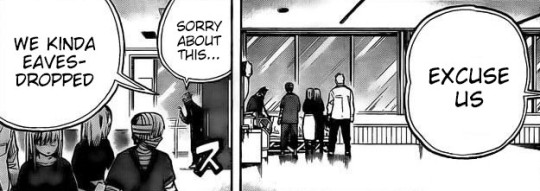
“our bad, we were kind of accidentally listening in on purpose.” like I said last week guys, no fuss. it’s a tradition
OMG
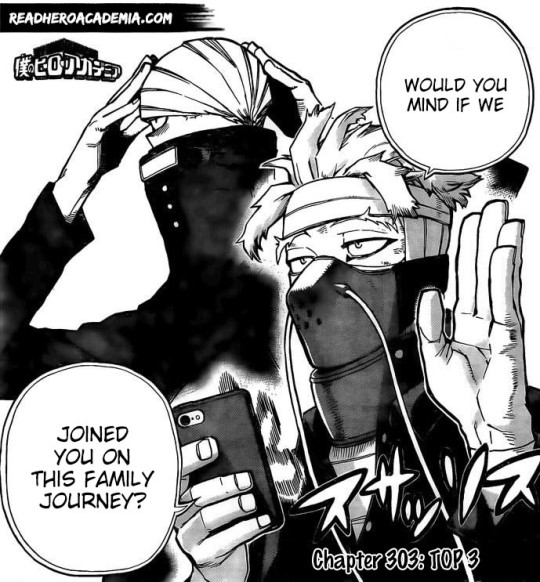
I am absolutely fucking floored. Hawks literally said that so casually that it’s impossible for me to rewrite it so as to be even more casual. that’s literally what I would write in the “today on bnha” section. in fact I probably will write that
(ETA: just for laughs I tried it and it really worked.)
a couple more things to point out about this panel:
“TOP 3” omg yes. more like “top only” at this point, honestly. interested to see how that goes
Hawks’s phone is freaking the fuck out about something, calm down there
I know this is a standard Jeanist hair-fixing gesture that he does all the time, but I can’t help but form hypotheses about this being a stress reaction because Hawks’s hair is making him internally freak out. Hawks, if this man tries to get you alone with him and some hairspray and a comb, please for the love of god do not listen to him. get out of there and call the authorities
omg Shouto’s face
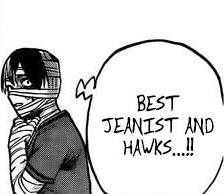
okay confession, I wasn’t really sold on the whole “Shouto has a schoolboy crush on Hawks” thing until exactly now, when I became 100% sold on it. that is adorable
and heck with it, gotta show Enji and Rei’s reactions here as well because lol
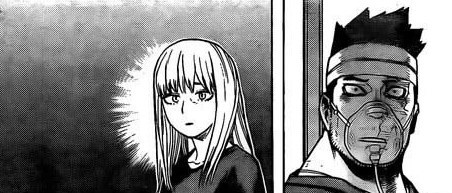
“omg my son who’s not my son, and he just overheard everything about me being a terrible shitty father and person overall, oh and plus my actual-son set him on fire and called him out on a national broadcast. I’m just gonna stare at him baffledly.” versus Rei, who is all “hmm, who are these people”
so Hawks is all “I got released from the hospital after one day for some reason so I made Jeanist drive me around places while we talked about life” but uh, heyyyyy, what’s Rei doing
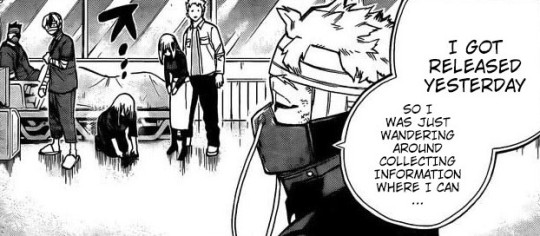
okay, uh
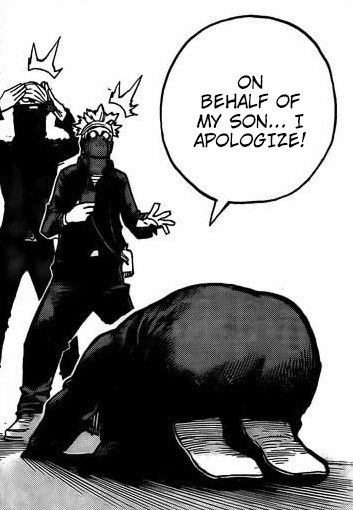
SO FUCKING FORMAL OMFG. “SORRY MY KID TRIED TO BURN YOU TO DEATH, APPARENTLY HE DOES THAT” REI NO IT’S NOT YOUR FAULT
HAWKS IS ALL “I’M JUST GONNA LAUGH SINCE THAT’S MY DEFAULT RESPONSE TO BEING PROFOUNDLY UNCOMFORTABLE”
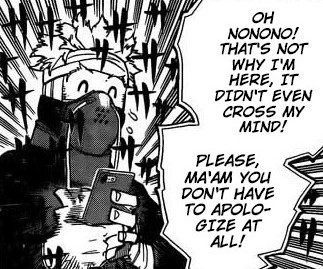
let me tell you a secret Hawks, it’s my default response too. ahahahahahahaha oh thank god Jeanist is helping her up -- AND MAKING A JEANS PUN, OF COURSE. IT’S BEEN ALMOST THIRTY SECONDS. MY MAN WAS DYING
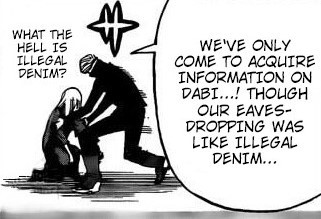
“WTF IS ILLEGAL DENIM” he’s talking ‘bout them counterfeit jeans, Rei. Antoine Bugleboy knows
THANK YOU JEANIST!! OUT HERE ASKING THE RELEVANT QUESTIONS

damn straight. we’re not gonna sit around waiting another 300 chapters for this information on this man’s watch
now Hawks is telling Endeavor he used to watch videos of him all the time, and calling him his “childhood obsession” I can’t
OH MY SWEET STARS AND MOONS

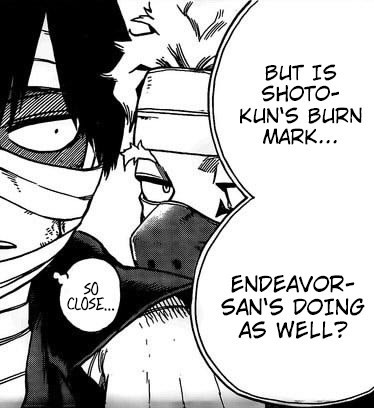
1000% CANON. “SO CLOSE...” ARE YOU SERIOUS. YOU REALLY PUT THAT THOUGHT BUBBLE THERE AND EVERYTHING. “GOOD MORNING EVERYONE, SO JUST IN CASE YOU WEREN’T ALREADY AWARE, TODOROKI SHOUTO IS NOT ACTUALLY STRAIGHT.” HORIKOSHI KOUHEI I AM LITERALLY DUMBFOUNDED. THIS IS AMAZING
and meanwhile that look on Hawks’s face while he casually-but-not-really-casually-at-all asks this question. that phone app better be using his actual voice. I’m not sure I could take this scene in the anime at this point if it was like Alexa talking or something
that look in his eyes is basically saying that so far, based on the information he has absorbed up until this point, Hawks is prepared to view his former childhood obsession as a flawed but changed man. however I get the distinct feeling that depending on Endeavor’s answer now, he would be willing to drastically shift some of his opinions on him
(ETA: this is maybe my favorite panel in the entire chapter. the fact that his question isn’t addressed to anyone in particular, but his eyes are zeroing on on Endeavor. and the way his leaning-on-Shouto pose manages to be simultaneously nonchalant and yet ever-so-slightly protective. there’s so much going on in this one question and gesture and I’m mildly obsessed with it.)
however, Rei is all “that was me” and ONCE AGAIN WITH THE FACES IN THIS CHAPTER holy shit

Hawks definitely did not see that one coming sob. it’s so fun watching him frantically recalculate his ideas about this family every two seconds
DAMN IT HORIKOSHI I UNDERSTOOD THE PARALLELS ALREADY, YOU REALLY DIDN’T HAVE TO DO THIS
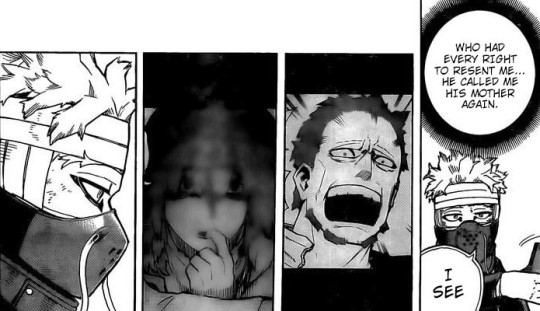
yes, Hawks, you get it. it’s not exactly the same, but it’s close enough. though unlike your shitty parents, Rei and Enji are at least trying
OKAY I SERIOUSLY CANNOT WITH ALL OF THIS
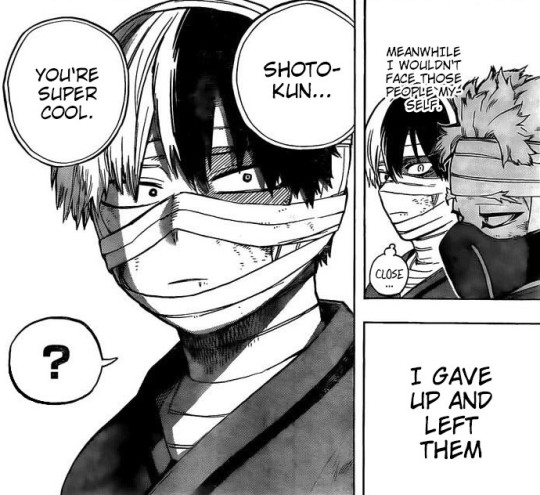
fljkdlaskfjlwkjl okay we’re doing the bullet-points breakdown here
first of all, the fact that poor little Shouto’s heart is still thumping away at this proximity and all he can think is “CLOSE” all intelligently as he stares at him with that face omg
and meanwhile Horikoshi has these STRATEGIC BANDAGES WRAPPED AROUND HIS CHEEKS TO HIDE ALL OF HIS SHOUJO BLUSHING omfg. SENPAI NOTICED YOU SWEETIE!!!
HAWKS YOU HAVE ABSOLUTELY ZERO OBLIGATION TO WASTE ANOTHER SECOND OF YOUR LIFE WORRYING ABOUT THESE TWO ASSHOLES WHO NEVER SPARED YOU THE SLIGHTEST BIT OF REGARD OR CONCERN IN THEIR ENTIRE LIVES. THE NICEST THING YOUR MOM EVER DID FOR YOU WAS BUY YOU A $2 ENDEAVOR PLUSH FROM THE DISCOUNT BIN TO KEEP YOU QUIET, AND YOU WERE SO AWED BY THAT ONE ACT OF SORTA KINDA APPROXIMATE KINDNESS THAT YOU SHAPED YOUR ENTIRE WORLDVIEW AROUND IT. PLEASE LET ME PICK YOU UP IN A BIG HUG FOR JUST A SEC, YOU DESERVE THE WORLD AND YOU WERE ONE THOUSAND PERCENT JUSTIFIED IN LEAVING THEM IN THE DUST THE SECOND THAT YOU COULD
but all that said, he immediately recognizes that Shouto would also have had cause to do the same in his situation, and yet hasn’t. and so he has that much more admiration for him all of a sudden, which is just super sweet, and fully appropriate. Shouto does deserve props. I’m choosing to take this as an “it takes a lot of strength to be able to forgive, and people who choose to do that even though they’re not obligated to are really amazing" type of thing, as opposed to “people who don’t forgive other people who severely wronged them are bad.” and if I’m wrong and Hawks’s line here is meant to be seen as actual failing on his part, well then fuck that, but we’ll move on
SO NOW, DOWN TO BUSINESS!
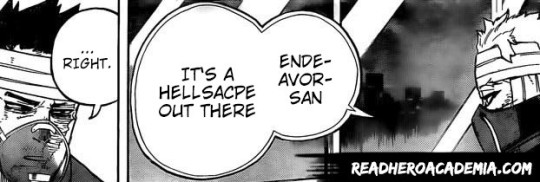
I am so, so curious as to what kind of strategy Hawks has for this (if he even has any), so I’ll just be quiet now and read
so Hawks is summing up basically what we already knew -- that Tomura and his inner circle (curious that there’s no mention of AFO, because if Hawks doesn’t know about him, that implies almost no one does) are still on the lam with a few PLF stragglers and some High Ends; that a bunch of prisons have been “liberated” (I assume this means all of the inmates escaped, so if that’s the case then where’s Kurogiri??); that the HPSC is fucked; and that heroes are resigning all over the place, and so civilians are taking matters into their own hands
OH DAMN!?
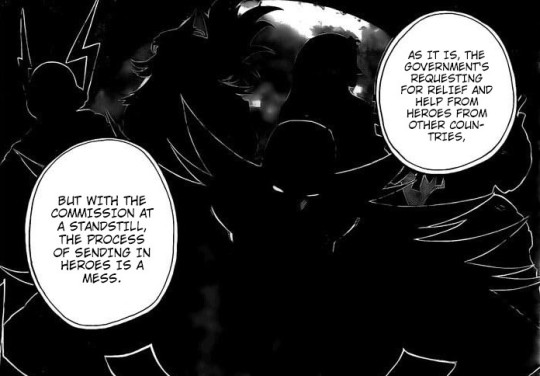
does this mean we’ll actually see some international heroes?? I will LOSE MY DAMN SHIT omg
(ETA: apparently people who paid more attention to the first BnHA movie than I did recognized the silhouettes as belonging to some background characters from Two Heroes. so maybe they were just cameos and they’re not actually new characters who are soon to join us lol. oh well.)
anyway so Hawks agrees with the other Todorokis that Endeavor has no choice but to fight
awww
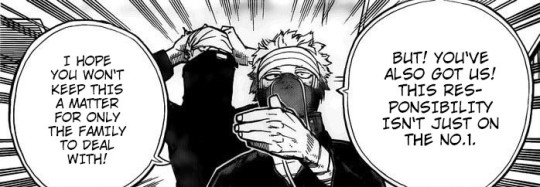
DON’T WORRY ENJI THEY’VE GOT YOUR BACK. WITH YOUR FLAMES, AND JEANIST’S PUNS, AND HAWKS’S BOYISHLY GOOD LOOKS, THE THREE OF YOU CAN DO ANYTHING YOU SET YOUR MINDS TO
so Enji is very pertinently asking why they’re standing by him in spite of the... [gestures vaguely to everything]
oh my lordy lord
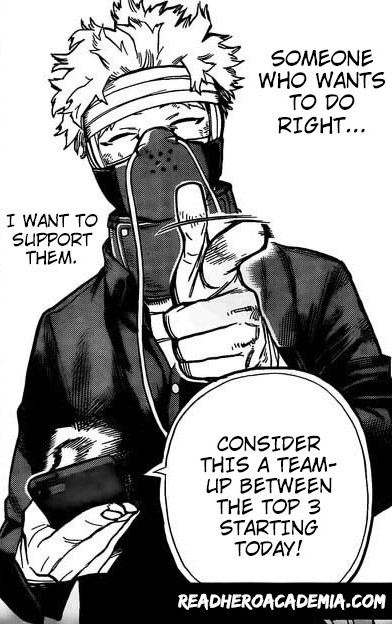
Shouto you had better do something to combat this soon, or this man will sneak past you on my favorite character ranking after all. his face. his cheeky lil finger gun. the fact that he sums it up so fucking simply. “if someone is trying to do the right thing, I want to support them.” exactly. exactly
(ETA: and one last thing I love but forgot to mention, which is the fact that Hawks calls it a team-up despite the fact that he is clearly in charge.)
meanwhile Jeanist is all “as for me, at this point I just straight up don’t give a fuck”
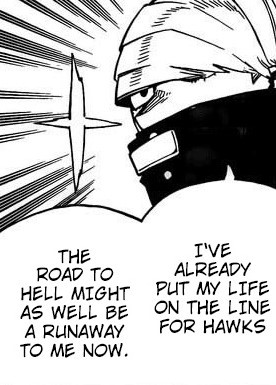
I can’t handle how fucking cool this chapter is you guys
so Hawks is all “you good?” at Enji. and Enji...
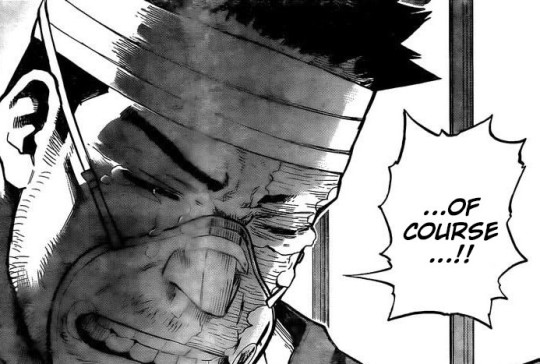
if anyone needs me, I will be building myself a discourse-proof fort made entirely out of problematic characters. I don’t even care. I will go on living my life very happily in here
lol at Natsu being all “BUT DON’T THINK THIS MAKES US FRIENDS”
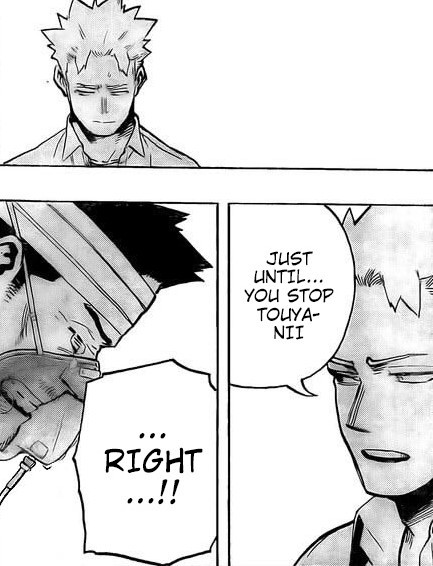
I’m living for this weird and no-doubt entirely unintended implication that Natsu and them all are gonna join in the fight with the rest of them. I mean, they do presumably all have very powerful ice quirks. and Natsu has medical training on top of that, and Fuyu is skilled at getting eight-year-olds to behave which could be a useful talent for dealing with Tomura hahaha I kid, but I’M JUST SAYING. who needs hero licenses anyway
OH SHIT FINALLY SOME DISCUSSION OF AN ACTUAL STRATEGY. even if it’s just a PR strategy
WHAKLHL
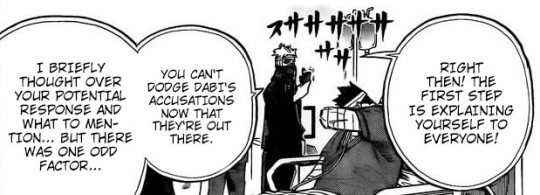

and now for some reason we’re flashing back to Natsu and Fuyu’s attempts to navigate through the media crowd outside the hospital
well I guess this is why I’m not the mangaka. if I were writing this I would have done something trite and predictable like using that “One for All” line as an excuse to cut to Deku!! as opposed to this entirely unrelated scene!!
seriously though why do we need to see this lol
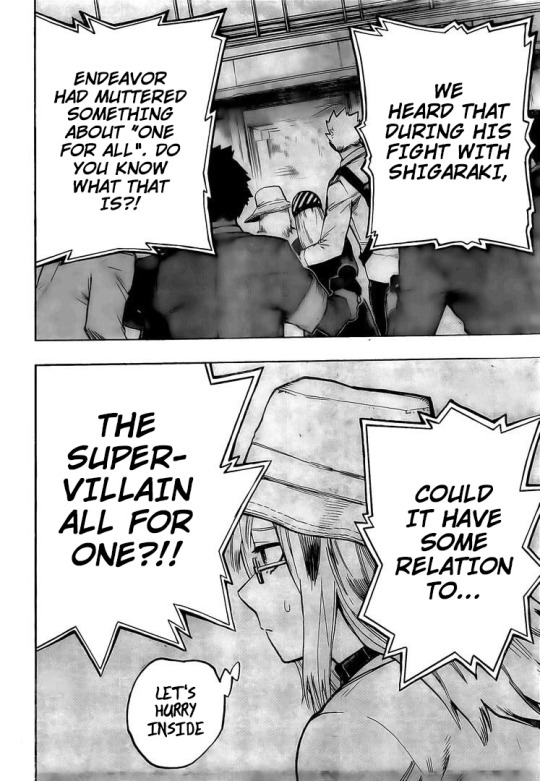
no one in this crowd has ever heard of Alexander Dumas huh. or even the popular 2007 Disney Channel original movie, High School Musical 2
so now there’s an entire page of Hawks saying they need to know what One for All is, and Endeavor having one of those patented Todoroki WHOOSH realizations lmao look at this
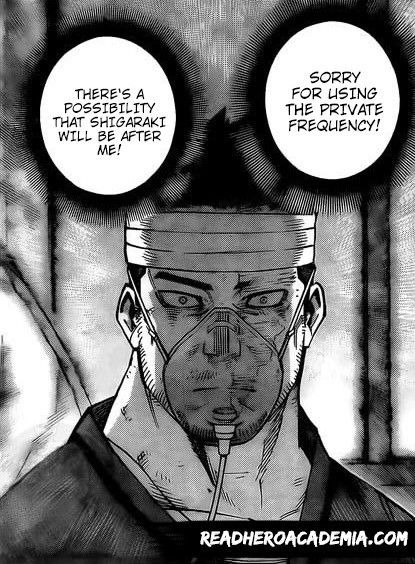
just wait until this man figures out that one of the scrappy new interns he took on three months ago was actually the main character all along
SKDFIOHWIERLKSJGLWLK!!
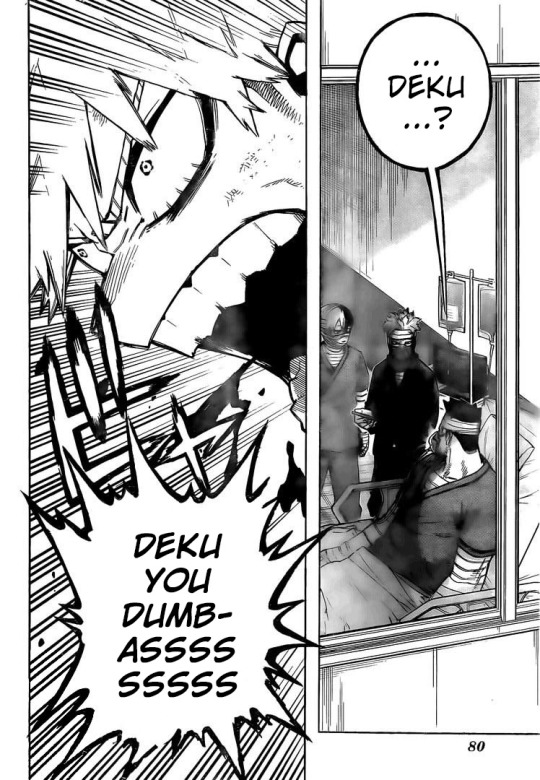
NOW IS PROBABLY A GOOD TIME TO ASK MYSELF WHY I CHOSE THIS CHARACTER WHO KEEPS DISAPPEARING FOR SIX OR TWELVE OR FORTY CHAPTERS AT A TIME TO BE MY FUCKING FAVORITE. WELCOME BACK SON PLEASE DON’T SCREAM YOURSELF TO DEATH YOU STILL HAVE A HOLE IN YOUR TORSO
NOOOOOOOOOOOOOO
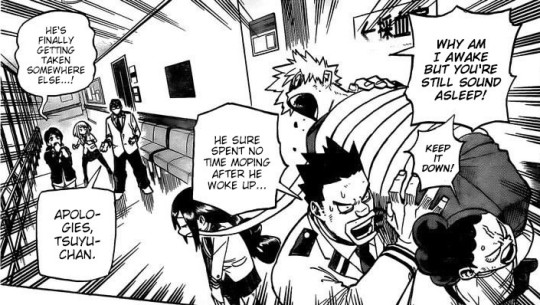
(ETA: can we just take a moment to appreciate how Bakugou even got so close to Deku’s room in the first place though. in this giant hospital with no idea of where to even go. does he have Deku Radar or something.)
YOU SIX ARE OFFICIALLY ON MY HIT LIST!! SPARE ME YOUR GOOD INTENTIONS!! MY BAKUDEKU REUNION KEEPS GETTING POSTPONED WEEK AFTER WEEK!! YOU’RE SUPPOSED TO BE HEROES WHERE IS YOUR CONCEPT OF MERCY
(ETA: btw just to be clear, I’m not actually angry lol; it makes total sense that they don’t want this rampaging feral toddler who was still in his own coma all of fifteen minutes ago to come and start screaming at the other coma child until he tears all his stitches out. if there’s anything we Bakugou fans should be familiar with by now, it’s being patient.)
also, Tsuyu wrapping her tongue around Bakugou’s still-healing torso wound absolutely can’t be hygienic at all. also wait is that Inko??
(ETA: pretty sure it is her. she got all of one line smdh.)
Iida is all “thank god Great Explosion Murder God Dynamight pulled through, I thought for sure he was a goner back there”
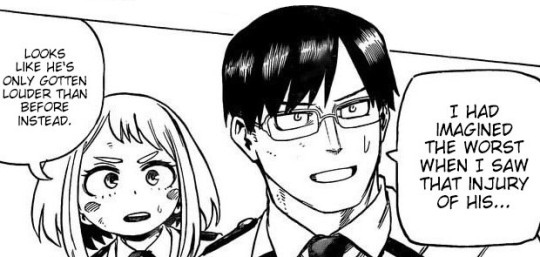
for the record this is actually really sweet to see how relieved he is. he’s one of the few people who saw the original injury close up, back when he was still at the battlefield and unconscious, so I imagine it really did freak him out quite a bit
JIROUUUUUU
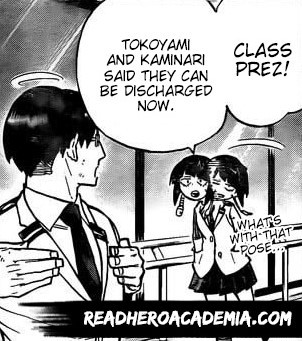
“sometimes I just like to stand here and tug on my imaginary suspenders, what of it”
how come you guys get to loiter around Deku’s room but Kacchan doesn’t. god fucking dammit. AND WHAT DOES THIS EVEN MEAN
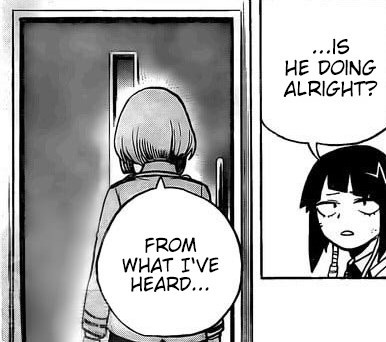
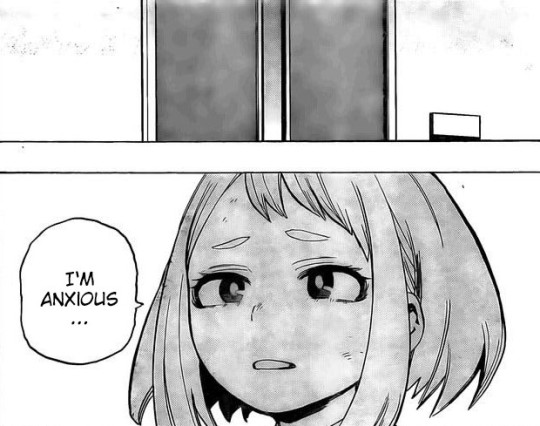
I BET KACCHAN COULD WAKE HIM UP FROM HIS COMA WITH THE POWER OF RIVAL INTENSITY!! BUT NOOOOOOOO, [is dragged away back to my fort]
OH MY GOD!?!
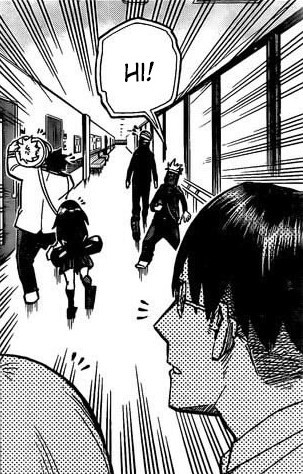
"this seems to be an entirely normal and above-board situation that we have just stumbled onto”
I see Jeanist comes from the Iida Tenya school of respectfully using people’s full names
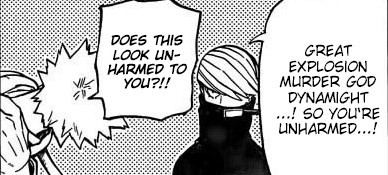
Jeanist becoming one of the main characters is the best thing to ever happen to this series
EXCUSE YOU, IIDA
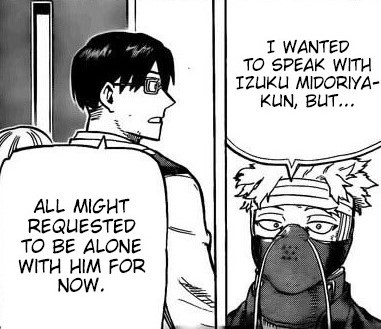
BUT I’M SURE HE’D MAKE AN EXCEPTION FOR KACCHAN THOUGH!! [elbowing my way back out of the fort] HAWKS, PLEASE --
DON’T GO ALL OMINIOUSLY PUTTING THE PIECES TOGETHER ALL ON YOUR OWN GODDAMMIT

“there’s absolutely no way this angry wriggling shoulder burrito kid here could answer literally all of my questions, so I’ll just ignore him”
OH MY GOD WE’RE FINALLY CUTTING BACK TO HIM BUT THE CHAPTER IS ENDING
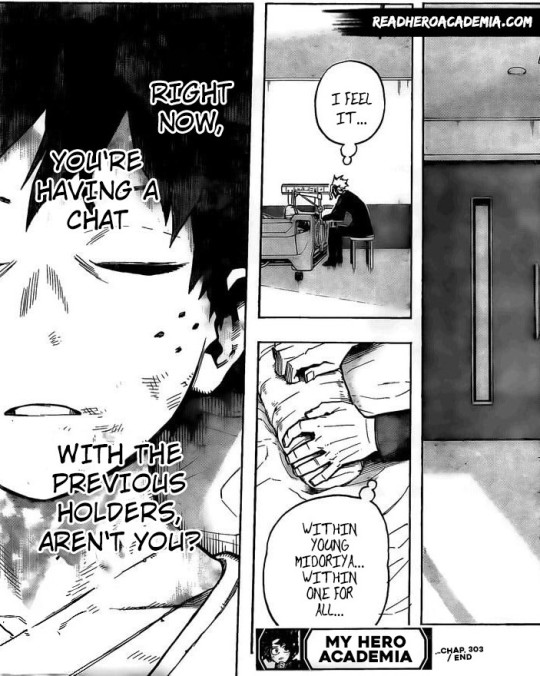
[jumps up, throws a folding chair at Iida and the rest of the gang, and then runs]
oh my god. actually this chapter was awesome. but I’m so fucking mad at this cliffhanger though lol
at least we got a couple of answers! and some hints and teases! poor Deku looks so worn out even though he’s asleep dlwkjl my little green baby. and is it just me or is his quirk activated?? All Might’s all “I can feel it” as if it isn’t obvious just looking at him, why are you trying to be all mysterious dude
anyway! so at least we finally have confirmation and a date for those vestige antics at long last. looking forward to meeting Mister The Fourth next week so we can finally ask him “hey dude, what the fuck”
#bnha 303#takami keigo#hawks#todoroki shouto#todoroki enji#endeavor#best jeanist#todofam#bakugou katsuki#class 1-a#bnha#boku no hero academia#bnha spoilers#mha spoilers#bnha manga spoilers#makeste reads bnha
283 notes
·
View notes
Text
𝐁𝐚𝐝 𝐛𝐥𝐨𝐨𝐝 | 𝐎𝐍𝐄
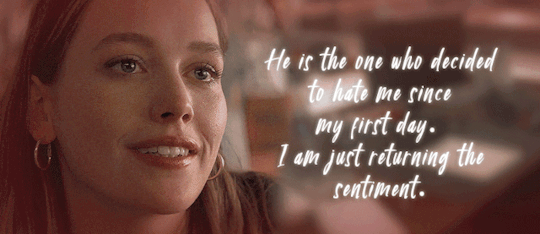
Summary: 𝐀𝐚𝐫𝐨𝐧 𝐇𝐨𝐭𝐜𝐡𝐧𝐞𝐫 found love during his teen years and ended up married to his high school sweetheart. However, he hadn't been prepared for the effects caused on him by a younger Agent and coworker.
Pairing: Aaron Hotchner x Original Female Character
Warnings: Mentions of/implied attemped rape, sexual scenes, adult language, angst, boss/employee relationship, cheating, age difference and canon-typical violence.
A/N: Before we start I just wanted to warn you that English is not my first language so you might see some grammar and spelling errors, if you spot any just let me know please. I hope you can bear with me! This story in also available on Wattpad
“You made a really deep cut and baby, now we’ve got bad blood…” — Taylor Swift
Rays of a morning sun shine through the many windows, bringing a needy warmth to the cold bullpen of the Behavioral Analysis Unit. As soon as one enters the room, the bitter but invitingly warm scent of black coffee would invade their nostrils; a much needed drink to endure the consuming aspects of working for the FBI. Hushed footsteps, discussions of rapports, chairs moving around and whispers of good mornings are the prominent sounds filling the environment.
At the center of the room, three distinct agents are discussing among themselves about gossips of the office. A strong, shaved headed man, with dark skin and a smirk plastered on his face. By his side, half sitting on his desk is a woman with fluffy bright blonde hair, thick black glasses supported by her delicate nose and wearing colorful clothes, making her stick out in an ocean of grey suits and blazers. Standing in front of them is a raven-headed woman, with pale skin and dressing a dark outfit like no one else could do.
While grabbing his mug and sipping his morning coffee, the man looks at his wristwatch, slightly shaking his head in a mocking disapproval and declares, “It’s officially five minutes since our work time started and Agent Davis hasn’t arrived,” he flashes a smirk to the black headed female who had being part of the team for barely a month and continues, “I hope you’re ready to witness your first breakfast time quarrel between the bossman and Amy.”
Emily, the sophisticated gothic woman, stares confusedly at her teammate and says, “Okay, I’m gonna take the bait. What are you talking about, Morgan?”
He flashes a mischievous smile, “Do you want to explain it to the newbie, baby girl?” Morgan asks the blonde and eager female to tell the new girl about the most volatile - and funny to watch - dynamic of the team. “I’m pretty sure you’ve already noted that my lovely girl Amelia Davis and our stiff yet good-looking Superior don’t tolerate each other,” Penelope happily blabbers. “Since today is Monday and Amy loooves partying hard on the weekends, she’s already late. Something that displeases the bossman who is constantly waiting to scold Amy because of her little mistakes.”
“That is intriguing. Are you sure it isn’t all about sexual tension? That would explain their behavior.” Agent Emily Prentiss questions inducing a gasp from Penelope and a laugh from Derek.
“We’ve all considered it at some point,” the man affirms. “Just don’t say that to Davis or she will lecture you about how terrible it is that two people of the opposite sex aren’t allowed to sincerely and deeply hate one another,” he concludes and looks in the direction of his Superior individual office through the open blinds. “Hotch seems to be especially annoyed today so I bet he won’t even wait for Davis to reach her table before he calls her attention.” Morgan deduces and the elevator cheeps in sync announcing new arrivals, making the three agents stare in its direction. They see a couple of interns hurrying to the coffee marker and the next person to come out is the disheveled figure of Agent Davis. Her crystal blue eyes are hidden by black sunglasses, the woman’s usually perfect long brunette hair is currently disheveled, her button up white shirt is supporting some wrinkles while her dark grey blazer is in her left hand along with her bag. She connects the fingers of her right hand with her temple massaging it in a foolish attempt to ease the headache obviously caused by a hangover.
Amelia tries to walk discreetly in the direction of her desk, hoping she would pass unnoticed by her boss, but she isn’t successful. Seeing her state, Derek whistles and loudly states, “I think someone had a wild night,” he laughs with Prentiss and Penelope. His booming voice affects the balance of Davis, making her stumble over her own feet and before she gets a hold of her chair and tells the man to be quiet, the harsh sound of a door opening echoes through the entire space of the bullpen.
“Agent Davis. My office. Now,” the chief unit’s demand rings like thunder, giving chills to the ones around.
“Fuck,” Amy murmurs while taking off her sunglasses and dropping her belongings on her desk.
The brunette drags her legs, taking her time along the short way to her boss’s office.
Amelia feels like she’s in high school and the principal is calling to lecture her, but that’s something she never experienced during her school years since her teachers adored her effort to have the best grades and eagerness to learn. Besides, she could always blast a polite amiable smile to make people bend at her will. It came easily to Amy, being friendly and kind towards others, virtues that paid off and made everyone like her. Well, everyone but him.
The door to the room is already opened and to Amy, it resembles the entrance of a
scary and dark cave. After she’s inside, she makes sure to close it to shield herself from the curious ears of her coworkers. She goes straight to one of the chairs across from the stoic man, a journey she’s so used to, considering that Hotchner’s constantly expressing his discontent with her whether it was about being a few minutes late, or about a typo in a rapport, or even choosing to use a grey folder instead of the yellow ones. Everything would lead to criticism and by now she would just take it with humor. She mumbles a good morning but Aaron simply ignores it.
“Tell me, Agent, what’s your excuse for today? Two weeks ago there was something wrong with your car, four weeks ago it was a problem with shower. I can’t wait to hear about another one of your misfortunes,” there’s venom watering each word, his eyes colder than a winter day and his entire posture screams irritation.
Amy thinks how he’s ever so ridge when she’s around. Every time she enters the same room as him, the jet black haired man would instantly go ridge like her mere presence was a heinous crime. She’s used to it and more than happy to demonstrate that she is also offended by his existence.
“Would you believe me if I told you that my nanny died?” Davis playfully replies and grins, which boils Aaron’s anger further.
“Do you think this is some sort of joke?” he snaps, standing from his chair and positioning his hands on the desk that separated them. “I can’t have people in this unit that don’t take their job seriously and I don’t have time to endure irresponsibility and lack of respect.”
I bet you would have a lot of free time if you just left me the fuck alone, dude - Amelia thinks while maintaining eye contact with the man.
“One more day of tardiness and you will have to suffer consequences. Is that clear enough for you, agent?” he fumes.
She bites her lips and swallows a bitter response. Not afraid of the outcome, just too tired to deal with her boss’s intensity so early in the day. “Yes, boss.”
“You can leave now,” he grunts and sits back in his chair. Starting to reach for one of the files on his desk; at the same time, Amelia makes a quick way out of the room. Once she gets to her chair, she releases a loud sigh, longing for the day to be over already.
“That seemed intense.” Emily comments. She and Morgan are in their respectives chairs and Penelope has made her way to her own office - after the end of the show, of course.
“You have no idea,” Amy answers while starting her work.
“If you don’t mind me asking, what happened between the two of you?” Prentiss carefully asks, genuinely curious.
“He’s the one who decided to hate me since my first day, I’m just returning the sentiment,” Davis explains, unbothered by the question, being a curious person herself she knows how it is once interest sparks. That’s when Dr. Reid and Agent Jareau arrive, talking to themselves. Spencer is carrying a notebook with a sketch of a boy’s face in it, moving around the room frantically and picking a telephone.
“What’s wrong?” Amelia worriedly questions.
“Need to get that to everyone as soon as possible,” Reid hurriedly explains while making a call. “Detective Barnes, this is Special Agent Doctor Spencer Reid of the Behavioral Analysis Unit in Quantico,” he clarifies to the person on the other side of the phone and continues rapidly, “Have you had recent murders involving prostitutes? They would’ve been stabbed to death and their hair would’ve been cut off by the killer,” that causes the other Agents to exchange confused glances, intrigued by the sudden event.
“When was the last recent victim?” the Doctor inquires to the Detective on the line.
Seems like we have a case, Amy processes.
#criminal minds#aaron hotchner#ssa aaron hotchner#aaron hotchner fanfiction#aaron hotchner imagine#aaron hotchner fic#agent hotchner#aaron hotchner x oc#aaron hotchner x you#criminal minds fanfic#hotch x oc#aaron hotchner x reader#aaron hotchner x fem!oc#aaron hotchner angst
60 notes
·
View notes
Text
Unsolicited writing advice???
A ton of you have commented with such kind and complimentary words about my Naruto fic Hiding in the Leaves and its characterization through the shifting POVs. Thank you all! I’m gratified to hear that you’re enjoying it. Some are asking how I shift perspectives and still manage to keep the characters in line. Actually, a fair number of readers have asked for actual advice, so here we go. This is a lot of writing babble, I hope it makes sense but feel free to drop me an ask if anything is unclear!
(1) I read a lot. I read all the time. Easily a book a day, maybe two days. And when I do, I practice critical reading—or as they say, reading like an editor, so I can pick at techniques other writers use. Writing is an art you learn largely by example. A lot of what I read influences what and how I write, so when I need to change my tone or voice to fit a different character, I usually read something that matches what I want my prose to sound like, on top of using techniques like changing tenses and playing with vocabulary choices.
I recently had the chance to flex these writing muscles because I went from writing two very distinct human voices (Tony Stark & Stephen Strange) to writing an alien voice (Loki). It was fucking hard; those in the Marvel fandom might know what I mean. Tony and Stephen are both human, born and raised in America, with specific life experiences that inform their daily decisions and personalities. Loki, on the other hand, is an alien: raised in Asgard, stolen from Jotunheim, well-traveled throughout the Nine Realms, and moreover raised as a prince. Just stop and think about that. When your characters do not have the same experiences that you do, they’re bound to not have the same earthbound concerns that you do. Anthropomorphizing non-human (or even non-living) beings is an age-old practice, but to be faithful to his character, I tried my best to twist my writing voice into a different shape—a shape that more befits the prince of a realm that is somewhat humanoid but very different from what we know on Earth. And in order to do that, I did four things:
I changed my prose from past to present tense; it sounds more immediate and assertive
I read three books, written in present tense, where the prose mimics what I imagine Loki would sound like in his own head
I made a huge spread of everything about Loki (both canon and my own orginal additions) that would inform his motivations, internal concerns, emotional responses, and decision-making processes
I drowned myself in Loki fanwork
Immersion is key! If you saturate your brain in a specific type of rhetoric or style, that’s what’s likeliest to come out of your productive process at the end. So controlling what you read/watch/listen to will help control your writing style too.
(2) This further breaks down what I just said in the third bullet point above. Before I start writing from a specific character’s perspective, I’ll take the time to brainstorm and build that character from the ground up. This might take a day or two and includes a staggering amount of detail—just as much detail as mine or your life might comprise. Silly little things like favorite colors and foods, hobbies, dislikes. Oftentimes, if you’re a fic writer, this is easier because canon gives it to you. Those amazing wiki-pages exist to make your life easier in this regard. (Bless.) What canon doesn’t give you is where you can dig in. Go deeper. Pin your character down. Think about more serious considerations like emotional triggers, conscious motivations, subconscious motivations, coping and defense mechanisms. When hurt or under stress, are they the type to lash out or curl in? Are they the type to hold on to a grudge, or do they prefer to forgive and forget? Do they get hurt easily or do they have a thick skin? I imagine the character’s relationships in life, I rank them and network them in my head. Who do they run to when they need advice? Who do they like hanging out with when they’re happy? Who annoys them, who inspires them, who scares them, who do they want to be like? Even if these questions aren’t necessarily things you might discuss in your fic, it helps inform this person you’re writing about, so it helps you keep a clearer and more consistent mental picture of them as you go.
But most critical of all, I sit and imagine myself in their shoes and think of how they perceive themselves. That is a major factor when writing, because that’s what their head-voice will sound like. And if the story is written from their perspective, then that means you, writer, are writing in that head-voice!
Here’s a more HITL-specific example (I’ll try not to spoil too much lol):
Sasuke
How he sees himself:
Ordinary; not very impressive as a shinobi, but not absolutely terrible either – just ordinary
Average looking
A slow, impatient learner
Awkward with people, but polite and with good intentions
Emotionally stable
A good reader and listener
How he actually is from someone else’s POV:
Incredibly skilled for his age and level as a shinobi
Actually quite handsome
An intuitive learner, very tenacious and will keep at a task forever until he gets it just right; perfectionist much
Quiet, polite, notices a lot about how others act
Absolutely does not handle emotions well
Selective listener; sometimes only hears what he wants to hear
Rationales:
He’s surrounded by a clan of perfectionists and overachievers who constantly laud his aniki for being a genius while paying him no attention. Of course he thinks he’s ordinary.
No one ever compliments him for his looks in the clan compound, and what he sees in the mirror looks just like a younger version of everyone around him. Of course he thinks he’s average, even though he actually has looks.
Because he’s largely self-taught (except for when Obaa-sama teaches him), he thinks he’s slow. (Ever learned a new skill or maybe even a new language by yourself? I have. I can tell you that my perception of how much time I spent learning ‘basics’ was skewed.) He also holds himself to a higher than normal standard because that’s what gets him positive attention (or attention at all) within his family. Add the fact that Itachi was there blazing through everything before him, and it’s suddenly easy to understand why Sasuke thinks the worst of himself as a student. But he (and Naruto) are actually fast learners—we see this even in canon—and both of them boast high levels of natural intuition, or as I (the neuroscientist) likes to call it, pattern recognition. Some people are naturally better at this than others; there have been extensive tests done to show it. But we also know intuition can be trained, so the more Sasuke works at something, the better he gets, and the faster he learns the next skill—as long as the learning is patterned. Which is why Orochimaru, who has picked up on this trait, walks them through learning each jutsu in a stepwise manner every time.
Sasuke doesn’t have a lot of social interaction outside of his family. The Uchiha clan in this fic is very segregated from the rest of the village, so if you’re not active as a shinobi, you probably don’t get out of the compound much. Interacting with people probably intimidates Sasuke a lot so he feels awkward about it and reverts back to habits of politeness and silence that he was taught from childhood. That doesn’t mean that he’s not paying attention, however; Sasuke is naturally observant and remembers a lot about how people act (and not so much what they say). I have a theory about this related to the Sharingan but I won’t go into too much here because it would be a straight-up spoiler, sorry. :D
He thinks he’s emotionally stable because he doesn’t remember many incidents of severe emotional upheaval in his life. That’s because he hasn’t had them; apart from the whole thing with Itachi, he’s been fairly sheltered his whole life. But he actually doesn’t handle emotions well—something he’s about to find out soon enough—and for the same reason! He hasn’t been exposed to an extensive range of it.
Because he’s largely self-taught, he has confidence in his reading skills. He also remembers all of Obaa-sama’s stories so he thinks he’s a good listener. Well, he is—to an extent. If he wants to listen, he will. If he doesn’t, he’s just as proficient as Naruto at pigheadedness. (I think it’s an Uchiha trait too lmao.)
That was a lot, right? But you can see that if I’m writing from Sasuke’s POV, I have to keep a different set of pointers than if I’m writing from Naruto’s POV about Sasuke. The way I think of it is like changing lenses or shades depending on the light outside.
A few more techniques/guidelines I use:
Stay consistent with vocabulary. Orochimaru is far more verbose than the rest of them, Shikamaru right behind him, and Naruto uses shorter, simpler words. You can even assign particular words to a character, a word only they would use when referring to something. This applies to how your character addresses other people too, i.e. Orochimaru calls them ‘little ones’; Shikamaru calls his dad ‘oyaji’ in front of his peers but ‘otou-san’ in front of his sensei; Naruto is quick to give people nicknames and most of the time it sticks.
Watch the adjectives; different people describe things differently. Orochimaru uses more nuanced words that can mean different things depending on the situation and mood; Naruto thinks in terms of emotions, a lot of how does this make me feel; Sasuke is very visual and notices a lot of colors.
Use speech habits wisely; how your character talks should reflect their life. Just like accents, speech habits can tell a lot about a person. Sasuke always speaks politely because it’s how he’s supposed to talk at home, otherwise there’d be trouble. Naruto grew up in a poorer district and had no one to really teach him how to talk politely, so he’s very casual. Shikamaru cusses at age eleven because his parents and family are incredibly laissez-faire and honest around him, so he thinks it’s acceptable and normal (and he was never reprimanded for it).
Play with your tenses. Writing in past tense sounds and feels very different from writing in present tense. Depending on your character, one or the other might sound more appropriate. There are some expressions and figures of speech that sound fine when written in past tense but awkward when written in present tense, so that will end up inadvertently changing your prose a bit, which can be useful.
Read your work out loud. Cardinal rule of prose-writing. What looks good on paper doesn’t always sound good when read out loud. If you read it and it doesn’t sound like how your character talks, time for a vibe check. You might need to change a few words and move sentences around, or you might need a complete overhaul… an editor (and I mean an editor, not just a beta-reader) can usually help you out.
A note about editors vs beta-readers:
There is a cardinal difference! A beta-reader is usually not professionally trained but should be experienced enough to point out things that aren’t right. In fandom, I’ve found that beta-readers mostly focus on a story’s general feel, flow and readability, sometimes character consistency, sometimes they point out typos and mistakes. An editor goes further than that. I’m fortunate to have Tria (aventria) who has edited my work for, gosh, 14 years now, fuck, we’re old! I call her my editor because when she goes through a piece, she will fix everything and make my draft bleed and I love it. (I actually get a little upset when she doesn’t fix anything, even if that means everything was good.) As an editor, she does a vibe check and looks for typos/errors, yes, but she also critiques the prose extensively. She can rearrange phrases or entire paragraphs for better flow. She will cut out entire scenes or make me rewrite them if they’re that bad. Like a copy editor, she looks at stylistic inconsistencies, grammar errors, and iffy word use. She’ll usually suggest or replace the offending word altogether. She has a lot of freedom with the work and can actually kick a piece to the curb if it’s really that shitty. She also questions plot progression, character development, and the relevance of a scene. (She’s made me cut out many, many scenes.) – That all being said, it’s not easy finding an editor, much less a good one. It also has to be someone you trust to have this much power over your work. It’s worth it, however, and my writing has gotten so much better because of the help.
If you’ve read this far, wow, thanks! You’re also probably thinking, “Shit, she takes this too seriously. It’s just a fic.”
I have… gotten into fights in the past before because of this. I feel strongly about the stuff I write. Just because it’s fanfiction doesn’t mean it isn’t a labor of love. I’m a perfectionist by nature, so that’s why I put so much time and effort into what amounts to ‘just a fic.’ And you know what? At the end of the day, writing it gives me satisfaction and happiness, so I will keep pouring into it as much as I can. It’s just a bonus to hear that other people are enjoying it too. (Yes, I’m one of those weirdos who intensely enjoy reading my own work…)
Aaand the final point:
(3) I double-majored in psychology for undergrad and have by now accumulated thousands of hours of clinical hours spent using the theories and techniques I learned from those classes on real people. I’m also specializing in neuroscience, so a portion of my time is spent in psychiatry. Characterization was actually not one of my writing strengths at first, but I definitely noticed leaps in improvement after my clinical rotation started. People skills are just that: skills which are honed with practice. It’s amazing how much you learn about how people think and what make them tick when you interact with a whole spectrum of examples: from your neurotypical everyday well-adjusted person, to high-functioning neurotics and obsessives, to patients who have suffered complex stroke syndromes, to encephalitic brains burning under septic fevers, to druggies stoned so high they’ve breached the atmosphere, to patients whose brains are growing insidious tumors, to schizophrenics and catatonics and the depressed. My job also allows me the rare opportunity to interact with people from all walks of life. All I need to do if I wanted insight about how life is for soldiers who served in an active warzone, for example, is to hit up Bill at the ICU and ask for stories about Korea and the Gulf and Vietnam. Or if I wanted to know about how to survive the Rwandan genocide, I could sit down with Amida, who survived it as a barely-teenager with her brother and sister in tow while only “losing my innocence and an eye.” Or I could talk to Heather, who is building a life with her husband and two rambunctious children, for a perspective on the daily concerns and delights of a ‘perfectly normal and ordinary’ working mother. (Her words, not mine; Heather is amazing even if she eats the doctor’s lounge out of Tita Annabel’s cookies.) Anyway, you get my point. When I write, I almost always write about people, so it makes sense that a lot of my inspiration comes from people too. A lot of my original characters—and even some that are not—often speak with the voices and inflections of people I know in real life. You probably have people with interesting stories to tell in your life; you just have to work up the courage to ask and take the time to listen. You’d be surprised at what you learn!
A few helpful writing resources: (most of these are classics)
The Elements of Style by Strunk & White
The First Five Pages by Noah Lukeman
How to Read a Book by Mortimer Adler and Charles van Doren
And more books that helped me get into people’s heads:
Hallucinations by Dr. Oliver Sacks
The Noonday Demon by Andrew Solomon
Far From the Tree by Andrew Solomon
The Lucifer Effect by Philip Zimbardo
Admirable Evasions by Theodore Dalrymple
I hope you got something out of that. Again, feel free to drop me an ask if you have any questions or want to chat!
127 notes
·
View notes
Text
sorry I don’t have more Scattered for y’all this week! but, see, i finally moved out of my terrible living situation uhhh yesterday so things are a bit hectic at the moment. hopefully next week? wish me luck y’all. IN THE MEANTIME, THO. An au that’s been stuck in my head for a while, that i realized i could chapter out to encourage myself to work on it more. hope y’all enjoy?
thorns that burst from my skull in the night (chapter 1)
[ao3] [ch 2] [ch 3] [???]
Fandom: The Penumbra Podcast
Relationship: Lord Arum/Sir Damien/Rilla
Characters: Lord Arum, The Keep, Sir Damien, Rilla
Additional Tags: Second Citadel, Lizard Kissin’ Tuesday, Canon Compliant, Prophetic Dreams, Alternate Universe, canon typical Arum ignoring feelings, (very mild suicidal ideation or at least. canon typical arum being reckless with his own life)
Summary: Arum has always seen glimpses of the future in his dreams. This gift is sometimes useful, but more often than not it leaves him with more questions than answers. The dreams of the flowers are particularly unhelpful.
Notes: I've had this one on the back burner for a while, but I moved into a new apartment literally yesterday, everything is a mess, and I did NOT have time to write a proper chapter of my current in-progress WiP, so here's the first part of something new! because that's always a good idea what the heck. Title from the song Pyrrhic Victory by Minimall.
~
Arum dreams a garden. It is the reoccurring dream the lizard Lord wakes from most often. Wakes gently, which is an interesting change from the vast majority of his prophetic dreams.
It is more abstract than his augury usually is, a flurry of soft petals, a distant singing, and the twang of- something. Something he cannot place. Elements of the dream rise and fade as it reoccurs, dragging out between years as it becomes just another part of his life. At times it comes with the distinct clash of steel, at others he hears a second voice join the song, and still again he feels either a frighteningly delicate touch, or the bite of manacles at all four of his wrists.
It bodes ill, Arum thinks. Flowers and song, and softness, it must either be a metaphor or an outright lie, and neither option puts him at ease. Even laced with the more ordinary threat of restriction and weaponry, he does not trust any of it.
He barters his services in exchange for access to the libraries of monsters he knows have an interest in botany, digs through tomes and guides until he can identify the other two of the three flowers from his dreams. The first he needs no assistance with; it is him. Always him, though it vacillates between the delicacy of the arum lily and the imposing spire of the titan arum. The other two, he finds with relative ease.
Honeysuckle, and amaryllis.
There is no direct connection between them, botanically speaking. They are unrelated entirely. They do not even grow in the same places, which is worrying because it indicates that this dream is almost certainly symbolic, and Arum abhors dealing in symbolism. It utterly undermines what little usefulness there is in his limited gift when he needs to wade through interpretation to find any actionable information in his prophecy.
He grits his teeth through his research into flower symbolism. It is almost entirely useless. Most flowers seem to have a wild array of meaning attributed to them, sometimes with ideas that entirely oppose one another. Amaryllis consistently seems to carry connotations of pride and determination, which Arum does not find distasteful, but it also means radiant beauty, which Arum could not care less about. Honeysuckle is more worrying; the meanings are all so soft. Happiness, devotion, affection, generosity, bonds of love-
Saccharine sentimentality, and selflessness. Nothing a monster should do anything but sneer at.
Another version of the dream arises around this time. He sees himself as he was in youth, the smallest of reptilian whelps, sees himself curled and sleeping in the throat of a flower, something not uncommon even in his adulthood. However, this time the flower in question is a beautiful and over-sized amaryllis bloom, with the other version of himself clutching to the pistil, the entire scene infused with relief and restfulness and safety. Arum wakes and feels hollow, that morning. Feels cool, feels uncertain, feels irritated with himself and his augury before he shakes the softness and rises to work.
That one of the flowers is arum, is Arum himself, concerns him further. If one of the three represents him, it raises the possibility that the other flowers represent someone else as well. Two different someones, likely.
He plants each of the strange flowers in his greenhouse. It is an act of defiance, of course, an act meant to rob the prophesy of any power it might otherwise have. He makes the symbol into something literal, something he can brew into a poison or a tea, depending, something he can touch outside of his dreams.
There, he thinks viciously, tending to the plants as they grow, pruning and fertilizing and brushing his knuckles soft down vibrant leaves. There. This mildest of prophesies is fulfilled. Here the flowers will be, and then the dream needs haunt me no more.
The honeysuckle blooms first. It fills the greenhouse with the scent of subtle sweetness, and when Arum places a flower on his tongue it tastes like a loose sunbeam, it smells precisely as soft as all of its adjacent symbolism, it makes him feel-
Well. It doesn’t matter. It is only a flower, after all.
The amaryllis are slower, but the blooms come just as wild in their time. They could be useful, he thinks, for brewing certain poisons, but he does not pluck a single flower. He could not explain why. He does not want to break any of those stems, and so he does not. It is enough of a reason in itself.
The dreams, of course, do not cease. The do soften, however. They come less often, but now the scent is more real in his dreaming snout, the sunbeam flavor filling his mouth until he could drown in it, but at least it is no longer a suffering of every single night. He may forget it, for days at a time.
He does not forget it. He could, he thinks. But he does not.
He hardly has time to worry over the matter anymore, anyway. His hard work and spotless reputation as an architect have (despite his other reputation as rather difficult to work with) gleaned him some arguably fortunate attention. Arguable, because while the eye of the Senate may be beneficial to him eventually, may earn him some protections or benefits he could not even predict, they are also powerful enough to threaten even Arum’s territory. If their attention turns sour, if they are unhappy with the results he produces (highly unlikely, his skill is unmatched), the repercussions could be severe.
The work is difficult. Demanding. It leaves little time for sleep, which allows him to avoid the dreams entirely, both those concerning his blooms and the other more troubling ones besides.
(cavern dark and wet, no magic here, only blight, only threat, only steel and mud and hatred and fear so sharp it curdles in the air)
(wilting song, wilting song)
(squalling of hundreds, his denizens, his charges, afraid afraid afraid and ready, as any animal, to bite back)
(weight unbalances, and so from the scale you must be)
Context. If the dreams gave even a hint of context he could use the information, but as it stands-
Arum works. The Keep works with him. They need be tireless, they need work beyond their means. He finds the Moonlit Hermit (another flower of which he has dreamed relentlessly, though at least those dreams had some use) and the work is easier, then, if no less time consuming. He must continue until the Senate is satisfied, or-
(wilting song, wilting song)
Or who knows what they may do to his home. He is relentless. He creates. He ceases to take satisfaction in this work. There is no time for that, and the weapons that the Senate demands are cruel in a way that Arum finds distasteful, regardless. There is skill in the work, of course, but Arum is diligent, and he samples his own poisons in safe quantity, and he knows what these things will do, to whomever the Senate turns them upon.
Arum does what he must. It was never his desire to make a crueler world, but-
But there is a war on. His desires pale in the shadow of it.
(the moment the first stone was thrown)
He dreams the Citadel, which is almost certainly the worst of portents thus far. It is an augury that makes sense more quickly than is typical. If his newest project can be coerced into doing as he intends, if he can manipulate them to grow fast enough to please the Senate, the resulting creature will require a tether. A focus. A direction in which to aim its ire, and that will mean-
Infiltration.
He wrinkles his snout in distaste at the idea, and the feeling of human-carved stone under his claws echoes back out from the dream. He is going to have to infiltrate personally, perform the task on his own. If he asks the Senate to find another to seek what he requires for his work, it will show too much weakness. He has no choice. He is running out of time to give the Senate what they desire, and his Keep is (wilting song) ill. And quickly becoming more so. He has no time. He has no choice. He must end this employment so he may turn his attention inward, so he may fulfill his deepest purpose.
He sharpens all his knives, and he does not sleep the night before he journeys out.
Perhaps this is foolish. His dreaming could give him some hint of danger, could allow him to see the troubles he may face, but he cannot stand relying on them, and he does not wish to attempt this reckless heist with the scent of flowers stuffed into his snout. If he fails, it will certainly be death, one way or another. He is willing to face that without debasing himself to the capriciousness of the dreams.
He will realize, later, that even if he had slept, the dreams would have only shown him the same as they had been showing for years.
Arum, and honeysuckle, and amaryllis.
#elle's fanfic#the penumbra podcast#second citadel#rad bouquet#lizard kissin' tuesday#lord arum#the keep#also the phrase ''arum dreams a garden'' has been stuck in my head since this au spawned#bless#oneiromancy au
44 notes
·
View notes
Note
I'm having a crisis and you're the Roy-person so I'm asking for your thoughts, though I'm not sure how active you are in fma anymore. Riza talks about Roy wanting to put the ishval war heroes on trial. Does this ever happen? Does Roy get executed? SHOULD Roy get executed?? Like, I love him to bits. He's my favourite character out of literally any character in anything. I want him to have a happy ending. But also...war crimes. Penny for your thoughts?
Oh, I'm the Roy person, that's so sweet, thank you! I'm not much in FMA these days (sadly- I'm always trying to get back into it, I have fics I REALLY want to finish) but I've always had opinions on this, so I can answer anyway! This is rather long-winded, because I've got many feelings on it, I'm a long-winded person, and it's been long enough that my thoughts aren't organized super coherently, so bear with me :D
My answer is no: I don't think they were executed. If you're asking purely what happened in canon, we never got an answer either way, but just for what my predictions/extrapolations would be, I don't think that they were. Or, at least, I don't think that they should be.
My answer is colored, of course, by Roy and Maes being my absolute favorites, and also by me being 100% against the death penalty irl. But I have two different reasons for this having always been my headcanon, and they also go hand in hand with another somewhat unpopular headcanon of mine, being that Roy /should/ have used the stone to restore his sight and /did/ get his sight back.
My first reason is asking - what good would this actually accomplish? Like I've said, I'm very much against the death penalty in real life, and firmly wish prison could be solely for rehabilitation and keeping the public safe, not punishment. It's a line of distinction that often simply isn't possible to do in real life, but as long as we're talking about a fictional ideal, here- looking at the Ishvallan genocide, the Amestrian soldiers that we know of who'd still probably be a danger to the Ishvallans, or who actually fully supported the genocide, are already dead. Basque Grand, Kimbley, Bradley, Envy. Killing or imprisoning Roy and Riza, rather than allowing them to continue rebuilding Ishval, accomplishes exactly nothing positive. It does, however, permanently remove two very important and politically powerful voices from any further restoration efforts, and stops them from continuing to work on rebuilding what they destroyed.
I like to parallel it with Scar. While we don't actually see Scar kill anyone innocent, I believe, we do see him try to with Ed and Al, so we can make the assumption that he did kill innocent people, not just soldiers from the genocide. The man was an actual serial killer, yet at the end of the series, we see him returned back to Ishval, smiling, healing, looking forward to helping to make the future a better place. Why? Because out of an imperfect situation, that's the best way forward that he has. He helped make the world a worse place, and while he can't take that back, the only thing he can do going forward is to actively try and make it a better place, instead. That's hard work. That's /work/, period, and you can't do that work if you're dead. Redemption by death is lazy and side-steps the actual redemption of working to right the wrongs that you caused. Roy and Riza both say they don't deserve to be redeemed? Okay. Redemption isn't about /you/, it's about the people that you hurt. And the people that get hurt if Roy and Riza are removed from the restoration of Ishval are the Ishvallans themselves.
(This isn't the same thing as saying they need to be /recognized/ for that redemption, in canon. The surviving families of Scar's victims are under no obligation whatsoever to forgive him, just as the surviving Ishvallans are under absolutely no obligation to forgive Roy, Riza, or Amestris. They're under no obligation to treat them kindly and would have every right to want them the hell out of their country, and Roy should respect those wishes wherever remotely possible.)
My second reason I like to think is more realistic, in that I just genuinely think, politically, it would be... a bad idea. There aren't many examples in history that I'm aware of, so it's mostly my own speculation. But Roy's plan is to spend decades endearing himself to the public eye, and transforming Amestris to a democracy, in what would probably make him the most popular fuhrer to prime minister imaginable in this fledgling, new, still unstable country - and then hold a very public trial where he and many other very important figures in the government are villainized and then executed.
This is a TERRIBLE idea. That is /begging/ for the country to be taken over again by a military dictatorship, because you can be damn sure there will be generals just waiting for the chance. It leaves a dangerous power vacuum at worst, and makes the new government horribly unstable and vulnerable at best. Back to my answer of what good would it accomplish? Well, I don't think it would accomplish much good at all, but I definitely can see many ways how it could lead to something potentially horrible.
I think that Roy spent decades working to accomplish his plan, because that is something that would take thirty, forty years: becoming Fuhrer, turning a very resistant military dictatorship into a democracy, working to restore rights to Ishval and start solid rebuilding efforts, overseeing those efforts to make sure they're more than just words on a page. That's the actual hard work it would take to even start to see real improvements that couldn't just as easily be taken back by a corrupt next president. There's no point where he's done "enough", where he's helped Ishval "enough" that it overwrites what he did wrong, it's okay, he can stop trying. But, by this point, he's probably in his sixties, seventies, after a very high-stress lifetime spent breathing in a lot of smoke. The life expectancy of men in 1950 in the US was 65.6 years. I really do think that he worked to restore Ishval until he died, and Riza with him.
#fma#roy mustang#riza hawkeye#ishvallan genocide#my opinions are also colored in that the perspective i'm least able to see things from#is the i want justice for these crimes that were done to me one#i've been a victim of a violent crime myself#and never wanted to see justice/prison result from it#so i struggle to see things from the point of view of an ishvallan#who just genuinely wants justice#which is a fair thing to want!#but anyway these are my two cents#i give you blanket permission to envision a happy ending for your favorite character anon
10 notes
·
View notes
Note
oof hey i hope i'm not bothering you, and i asked jury this already (and deffo got a good answer but i need all the info i can get because i am crushingly insecure)- do you have any tips on characterizing/writing the deh characters? i struggle with it immensely and I have no idea why, and you're one of my favorite writers for this fandom. so. no pressure to respond i was just curious!
sure! the only characters i write regularly/feel confident in writing are evan, jared, and alana, so those are the characters i’ll talk about the most, but i’ll try to say something for all of them. also this will feature a good number of quotes from writers’ notes (here) and interviews because those are the main sources i draw on for characterization after, you know, actual canon
evan
Smart, sincere, and cripplinglyself-conscious, Evan prefers to hover in the background, asupporting player in his own life, too afraid to step forward into thespotlight and risk ridicule or, what might be worse, no one noticinghim at all.
this description captures a lot of the things i think are key about evan, but one big thing it’s missing is that he’s kind of an asshole. he usually has good intentions, and he tries to be inoffensive and considerate and Nice, but he sucks at that because it’s just not how he naturally is. he’s bitter and angry about a lot of things - his lack of friends, jared (ostensibly) not caring about him or taking him seriously, heidi rarely being present, and perhaps most of all, his own perception of himself as “broken” and a burden, which he genuinely believes that heidi agrees with and that everyone else would if they knew what he was truly like. he’s frequently sarcastic and occasionally pedantic (see: “president” “co-president” and “it’s sula” “what did i say?” “sulu”). but these are things he doesn’t like about himself, which is why he tries to be either Nice or invisible, especially when he feels uncomfortable. the times when he’s most comfortable acting like himself are, in my opinion, when he’s just with jared, who in turn finds it most fun to spend time with evan when he’s not putting up a front.
major pet peeves in fic: being written as a ~delicate anxious bean uwu~ or anything along those lines; dialogue with stuttering that doesn’t resemble his actual speech patterns at all; making a big deal out of him using profanity; portraying his relationship with jared as evan just letting himself get pushed around until someone (usually connor) comes in to bravely show evan that He Doesn’t Deserve That
jared
Droll and sarcastic,Jared claims to be forced by his parents to hang out with familyfriend Evan, for whom he ostensibly has nothing but disdain.Jared covers his own obvious insecurities with a well-practicedbraggadocio and a know-it-all arrogance.
I think this is the playlist that Jared puts on in the morning on the first day of school to pump himself up for the day… Ultimately he’s terrified of going back to school, but he’s trying to psych himself up. … Every one of these songs is a JAM. No ballads here. And they’re all slightly sarcastic or tongue-in-cheek songs about unrequited love. Jared can relate to that. [x]
Jared Kleinman is too cool for the music of the times. He is proudly a walking 90’s movie… but he doesn’t mind sneaking a little of his parents Manischewitz and listening to a dusty Bette Midler record. [x]
(there are like a dozen interviews with will roland that i could cite here but that’s practically a post unto itself)
the best way i can sum up all the major points of jared’s characterization is that there’s always a reason for the things he says. he doesn’t make harsh remarks to be deliberately cruel or mean; he’s either pointing out an uncomfortable but important truth, or he’s aiming to make a joke and inadvertently crossing the line. when he does make jokes, it’s often another way of delivering the truth, an attempt to get people to laugh and thereby validate that he’s clever/funny/worthy, or an effort to deflect something that makes him uncomfortable or scared. redirection, derision, and showing off are some of his major defensive tactics; he doesn’t do self-deprecation out loud, but he is, as will has said, repressed and self-hating. he and evan are similarly asshole-ish, but where evan tries to hide it, jared tries to hide behind it.
he wants people to be impressed by him in general, but he really wants evan in particular to think well of him and be his friend and openly care about him - the problem is that jared can’t bring himself to openly care about evan, because that entails emotional honesty & vulnerability that he’s just not prepared to deal with. hence their interaction on the first day of school, and then jared agreeing to help evan more and more with his increasingly complex lie despite claiming not to care. (the key word in that first quote is “ostensibly.”) when he is actually is at ease (which is pretty rare, at least in canon), he’s a bit of a drama queen, which evan may pretend to be annoyed by but quietly enjoys.
major pet peeves in fic: being written as straight and/or homophobic and/or leaping to make jokes about how evan and connor are Clearly Doing It immediately after finding out that they’re becoming friends (as if he isn’t utterly convinced that evan is 100% straight); making excessive/forced references and jokes to modern pop culture/memes (everything he shouts out in any form of canon is at least ten years old and usually decades old, and that doesn’t happen often anyway); relentlessly treating evan like shit/being incredibly domineering in their friendship; constant bickering with connor; calling evan “hansen” all the time when he only ever addresses him as “evan” (or, like, “dude” or “bro” or “son”) and even only does THAT when he’s especially emotional or letting his guard down; just generally giving him dialogue that in no way resembles his actual, very distinctive speech patterns
(i have. a lot of thoughts and feelings about jared)
alana
Alana is an incredibly genuineperson. Everything she does comes from a place of deephonesty and tremendous feeling. All of the characters inthis musical put up masks of sorts. For Alana, it’s a façadeof cheerfulness. She is always ready with a smile, a note ofencouragement. This hides the loneliness underneath.
often prone to melodrama, high school senior Alana has few friends but lacks the self-awareness to understand why; beneath her extroverted demeanor, Alana is in fact haunted by a terrible and abiding loneliness; tired of always being an outsider, Alana seizes the death of a classmate as an opportunity finally to find a sense of belonging. [x]
Study break! … Alana spend a lot of time in the books. This playlist allows her to either kick back, have a lip sync battle, or a jam session. … We have classic up beats like ‘Uptown Funk’ by Bruno Mars cause she loves to dance and be silly. She’s also a romantic. Girl reads Jane Austen, so a nice healthy batch of love songs to daydream to. She’s also a feminist! So naturally Beyoncé has the perfect perfect pump up jams for the feminist in us all.
alana has Big Feelings, and they drive all her actions. she wants to achieve great things and succeed in life, yes, but more importantly, she wants to help people and make the world a better place. when she commits to a course of action, it’s because she truly believes that it’s the right or most beneficial thing to do in the end, even if the means themselves are questionable. much like jared, she struggles with vulnerability and connection with other people, and often tries to form connections with other people by making herself seem more impressive, but unlike jared, she also tries to build up and support other people, rather than tearing them down. she’s also committed to supporting Truth in a general sense, and struggles when this comes into conflict with Doing The Right Thing. this is especially obvious after good for you, when she resigns herself to continuing the fundraiser even though she’s certain it’s based on a lie.
all of this makes alana seem incredibly serious, but that’s not the entire picture. she strives to be upbeat and optimistic, and even when she’s not trying, she loves to have fun! she likes to be silly and tell jokes and laugh at other people’s jokes and daydream about finding a great romance! she thought “fuck finn” was the height of comedy! she’s not a killjoy!
i also hold with kristolyn lloyd’s theory that alana was very close with her grandmother and struggled with feeling unable/not allowed to openly grieve her death, or to express any kind of loneliness or other strong negative emotion. however, i do not hold with kristolyn’s theory that alana had a crush on connor, because alana is a lesbian.
major pet peeves in fic: being written as pedantic and joyless; overly formal dialogue (she’s perfectly capable of using colloquialisms and slang) in which she is never sarcastic, ever (she absolutely can be when she’s frustrated)
zoe
a sensitive, sophisticated high school junior; cool without realizing it, Zoe could care less about the status games and popularity rites of high school; funny and bright, she has grown up in the long shadow cast by her volatile older brother, Connor, tyrannized along with the rest of her family by his out-of-control behavior; few rooms are as familiar to her as the inside of a family therapist’s office; Zoe compensates for her brother’s darkness by striving to be warm, nice to everyone, the kind of person who goes out of her way to learn the names of the kids who sit by themselves at lunch; she feels a terrible ambivalence over her brother’s death, finding it difficult to forgive him for all he did, and at the same time forgive that part of herself that feels nothing but relief in the fact that he’s gone.
this sums up just about everything i could say, but i will add: the disembodied voice calling zoe a “stuck-up bitch” during ywbf reprise is NOT a voice you’re supposed to agree with.
major pet peeves: anything that states/suggest that zoe is a bitch; those connor/evan fix-it fics with background zoe/alana where the premise of zoe and alana’s relationship is “they’ve actually been best friends this whole time!!” even though this contradicts canon on multiple levels
connor
An angry, disaffectedloner, Connor has been a troubled kid for as long as anyone canremember, an enigma and a source of endless consternation to hislong-suffering parents and sister.
i honestly don’t have much to say about connor, because i don’t think about him very often, but i will say that:
- if your portrayal of him can be described as “edgy,” you’re probably doing something wrong. he’s just as awkward and anxious as evan, it just manifests very differently
- him addressing evan as “hansen” all the time is admittedly much more plausible than jared doing it, but still just as annoying
heidi
Overworkedand stretched too thin, Heidi loves her son fiercely, but fears theyhave begun to grow apart. She is prepared to do anything to repairthe damage.
heidi’s torn between trying to connect with evan and trying to provide a better life for him, because for her, achieving the latter currently requires spending too many hours away from home to really achieve the former. that’s why she’s so upset and demands to know what’s going on in evan’s life when he seems to be acting out of character and doing things she doesn’t expect him to do - she feels she’s being left out of the loop. much like alana, she strives for optimism, trying to find the bright side of any situation. and, as steven levenson pointed out in the annotated script (regarding the line about fabulous tips that evan’s stepmother may or may not have made from cocktail waitressing), she doesn’t have a fully developed sense of healthy boundaries, which is an interesting nuance that tends to get lost in fics that flatten her out into a generic Cool Mom. she’s trying to raise a teenager while not wanting to fully grow up herself.
cynthia
To Evan, she seems to be the perfect mother, nurturing, available,and willing to talk about anything. To her own children, it’s a bitmore complicated.
evan idealizes all the murphys, and cynthia is no exception. she tries her hardest to be a good and accessible mother, but she’s deeply dissatisfied with being just a mother. she works to support and empathize with connor, and to remember him positively after his death, but she frequently neglects and minimizes zoe and her problems in the process.
larry
Though often tense and taciturn, Larry shows a different face tothe world, representing for Evan the dad he always wished for:strong, confident, and, more than anything, reliable, someone to becounted on.
is larry going to call his children slurs or disown them/kick them out of the house for being lgbt? no. is he going to research How To Interact With Your LGBT Child and drive connor and zoe to the local pride parade? also no. the once-popular (and possibly still popular?) characterization of him as a demon straight from the ninth circle of hell is just as inaccurate as evan’s perception of him as the World’s Greatest Dad.
i hope this helps! and thank you for asking - i really enjoyed answering this, and i’d be happy to expand on most of these points if you want.
#inbox#thecicadasong#dear evan hansen#evan hansen#jared kleinman#alana beck#zoe murphy#connor murphy#heidi hansen#cynthia murphy#larry murphy#sometimes i write
56 notes
·
View notes
Text
Meta Writing: "Finding balance as a television viewer and academic, a look at viewing under the narrative lens versus the psychological lens"
I’ve spoken on Supernatural’s utilization of a mirrored narrative to tell the repressed story of its main characters many times. My blog is full of these essays and discussions. As a meta writer for Supernatural, this is what I've focused on writing over the years because I found this to be where the complete “full picture” of the story of the show was to be seen. If Sam and Dean weren't openly talking about their issues then one could simply look at the monster/victim character foils within the MOTW episodes and listen to them talk where Sam and Dean either wouldn't or couldn't. If one wanted to understand the main characters and their situation better, the show practically forces one to do this. Or rather, I should say, I felt it forced me to do this. And for a long time I got used to looking at the show through this type of narrative lens, where practically everything told the story of something else. I wasn't looking at Charlie Bradbury anymore, I was looking at a narrative mirror for the issues of Sam and Dean in 9x04, where the witch symbolized codependency and Dorothy wasn’t a woman trapped by her own mechanics, but rather a sounding board for Sam and Dean trapped by their own.
I must say, it's not a terribly fun way of looking at the show, but I thought, back then, a practically necessary one. Supernatural is post modern, after all, and frequently has episodes pointing out its own function as a story. Robbie Thompson did this a lot (9x18 is forever one of my favorite episodes) and I remember someone asking Robbie about the mirrors of 8x11 on Twitter back in the day, where 8x11-8x16 represented one of the most blatant romantic coded arcs Dean and Cas has ever been given in the structure (as viewed through the "narrative lens", but I'm getting there!). The person asking Robbie what his intent with the mirror was was clearly viewing the show the way I was (with the narrative lens) so I was curious as to Robbie's answer. And when Robbie did answer, I remember being disappointed. He told the person, "That's just how I saw the story of Charlie and Glinda." This was a recognizing of the what I’m going to call the psychological lens (the surface, real life), but not the narrative one. No acknowledging of how they functioned in that arc as a narrative mirror for Dean and Cas, nothing. I felt that as a writer using such a structure it was almost his duty to at least acknowledge it. But it was like... none of them ever did. Supernatural clearly used it, hell, still uses it, but it's only ever mentioned in passing, in showrunner interviews and the like.
Probably every documented case of anyone with creative content creation control referencing it (the mirror narrative) is on this blog. Back then, I was very obsessed with validating what I was seeing in any way I could. It was like figuring out a secret, a mystery, a truth I absolutely knew to be real and then gathering as much evidence as I could to prove it because people were telling me that I was wrong and I knew I wasn't. Stuff like 9x15 even bent characterization to cater to it, to sometimes the complete confusion of the actors. And so that's what meta became to me. Using the narrative lens I viewed and wrote on the narrative structure at length, writing standalone essays on the matter, discussing it in threads and speculating using the structure to extrapolate how likely certain plotlines were. Sometimes you're right, sometimes you're wrong, but usually not about the big stuff, the stuff a season was building towards. The longer I studied the show the better the better I got at recognizing its patterns of repeat. And for minds like mine, with autism, which are best suited for pattern, these patterns just come so naturally. For me Supernatural is honestly so predictable, for many reasons, the most of damning of which is right in the structure and its inability to go past a certain point.
I say this word a lot, "structure". My family hates it. What I really mean is its overall design. When I talk about the structure of a car I'm talking about how it looks: the color, the features, the durability, the points of safety, whether it drives smoothly or not. Things like that. When I talk about the structure of a story I'm talking about how it looks as well: how it is paced, the significance of the characters involved and whether they and the themes involved within the story itself "teach" the main characters anything, what relationships are formed and how they transform each individual character, (and for visual mediums) the overall visual presentation of light/color, how the setting visually informs what the characters are doing or saying, what the characters are designed to learn through the show pointing out such steps in various ways and then cleanly implementing traditional arcs that change them in some way (usually to betterment, but not always). All this is structure, a story's design. Visual mediums like theatre and television have an obvious visual element meant to be incorporated, designed to support (and not work in place of) the story being told. Analyzing a book is not the same thing as analyzing a television show. Analyzing a television show is much, much more complicated. Books contain one author and one editor (usually). Intent and meaningful storycraft is usually easy to decipher. If design in detail matters, the author provides that information. Television, on the other hand, involves hundreds of people refining and creating on a tight deadline. This makes deciphering meaningful story intent particularly tricky.
Discussing the structure, the story telling elements, using that knowledge to speculate or write essays giving a reading of the text (what the term “meta” generally refers to) is what we'd call viewing the show through a "narrative lens", or rather, in the case of television, a "television lens". It's when you watch the story and realize that you are not looking at real life. This is easier for something like cartoons (moreso when humans are completely absent), but a little harder for the brain to actively distinguish when looking at something that could *almost be real* (as in, live action people in a familiar setting). Understanding how fictional rules are different from real life is only half the story though because real life must be accounted for in visual storytelling. I’ll explain what I mean because I’m not talking about behind the scenes stuff. Since being sent an ask about the current state of the meta community (which I still occasionally write for but don’t personally follow anymore aside from following my friends @mittensmorgul and @elizabethrobertajones) I’ve been thinking about this a lot. The fact that we’ve lost a lot of voices over the years as a community of narrative academics is, I think, the root of the challenge currently facing the meta community. With so many lost voices and angles there's a significant sort of echo chamber that begins when you get people together that all view the show through the same lens against a lack of diverse readings. In this case, the narrative lens and the Destiel reading. You see, the problem is the show, as it exists now, isn't always so rigidly written through the narrative lens like it was in Carver era, it's now written primarily through the real life lens. I find this to be especially true in Dabb era showrunning.
Regarding the meta writing community and the fandom's two main shipping sides, there’s also a huge disconnect, fostered over YEARS of discord in acknowledging subtext designed by writers for both factions, both readings, and, of course, the arguments over intent (which is usually unknowable unless a public record is made and even then a lot of academics ascribe to “Death of the Author”, particularly given the collaborative nature of television production, so...). Wincest subtext gets scoffed at or ignored, derided for not standing a chance at being canon by the Destiel side and the Wincest side often mocks the Destiel side in such a profound way (pun intended) as to suggest (or outright say) the subtext isn’t even there at all to mean anything in the first place (which is ridiculous). Again and again I also see (and it's never really worded this way) a disconnect over the lens the show is viewed with: narrative (televison) vs psychological (real life). The most major arguments I see are between fans watching for the Wincest reading and using the psychological lens versus fans watching for the Destiel reading and using the narrative lens.
There’s rarely any common ground between these two distinct groups, with the Wincest psychological viewers acting more as critics than providing anything resembling essays of their own. Maybe they are out there. I haven’t seen them. Most “good” Wincest meta died out relatively early. We, as a viewing and academic community, are a house divided in so, so many ways, even on each side of the chasm. Maybe I have no right to make this post. I don’t know. I don't like things that treat fandom like it's something to be picked apart and examined. This kind of examination makes me... uncomfortable. I keep thinking about that ask the other day asking me what is going on in the meta community though. So I'm going to try and tackle it. The fact is... we are not a whole and we are not supposed to be. That’s the point. Getting a single exact read off any text, let alone getting a group of people on the same page to watch with the same lens, is practically impossible. But lately the divide and inbalance has gotten to be so bad that we aren’t even talking to one another anymore, not really. We are all just yelling a lot of misunderstandings back and forth. So... what is happening to the meta community? I'm going to try and talk about it.
Okay. So I've explained what structure is and what a lens is. So now I'm going to talk about balance because the current issue plaguing the meta community is a lack of voices discussing and viewing things in balanced way. And I'm going to focus on ship related meta writing because let's face it, that's where a lot of the most passionate arguing is. Since meta is usually written with a bias for a certain reading we most often get four distinct readings:
A --The Narrative lens: Wincest
B --The Narrative lens: Destiel
C --The Psychological lens: Wincest
D --The Psychological lens: Destiel
Post S12 when Dabb era started I personally made the decision to switch from writing/watching through B to D instead. A narrative lens focuses on things like mirroring, set design, character arc reading. A psychological lens focuses on things like characterization (usually with a focus on where a character is and not how they are designed to change), seeing the characters as real people, rather than narrative constructs. Lynn from Fangasm is a good example here and I don’t think she’d mind me mentioning her here. Lynn, as a psychologist by trade and J2 fan by choice, views the show through a Wincest psychological reading, in total opposite from me in Carver era Supernatural, viewing with a narrative Destiel lens. We disagreed on a lot on stuff as you can imagine. I read her from time to time but she didn’t read me. Now, sometimes viewing one lens too much can make you blind to other things (not limited to readings). Frequently she’d hate and not understand things that I felt were explained perfectly as viewed through my lens. It's the difference in seeing Charlie Bradbury personally go through some stuff vs seeing Sam and Dean's issues elaborated on in the complex abstract. However, for me, post S11 I found myself way too stuck in the narrative lens. I felt I wasn't even seeing or experiencing the show the way it was designed anymore. And I wasn't. And being that Supernatural is part of my job I knew I had to reorient myself.
In Dabb era in particular, there's text and communication between the characters, which means that a narrative lens isn't strictly needed for viewing anymore. When S12 was airing I had the absolute pleasure of meeting Robert Berens and talking to him at length about meta. My friends @ibelieveinthelittletreetopper and @nicky36 were with me and the post is on my blog somewhere. Berens is my absolute favorite writer for the show. I talked to him about the narrative lens and how stuff like what he wrote about Mary leaving in 12x03 lost its emotional resonance with me because I knew she was leaving for contractual reasons, rather than general characterization ones. It was a problem with me, rather than a problem with the writing itself. It's watching a puppet show and instead of paying attention to the story, staring at the strings the whole time. I knew I had to learn to stop that even before talking about it to anyone. We also talked about 9x06, which was my favorite S9 episode as a Cas fan! I remember I talked about the season's theme of consent issues and I mentioned something from the divine reviews I wrote about a consent reference 9x06 made through a pop culture reference about the sex practices this random island had. He wrote the episode and chose this island to reference. I thought surely he knew what I was talking about. I was complimenting his cleverness, after all. And I'll never forget what he said to me: "You know, meta writers are often far more clever than the writers are themselves." It means we, as pattern seekers to themes (in the case of S9, consent themes), can pick out any kind of pattern if we are simply looking hard enough for it. And some things that we think are intentional, are simply coincidental, even within the written screenplay. After talking to Robert Berens that day I never looked at meta writing the same way again and began to work towards switching my viewing lens.
That's not to say viewing the show through the narrative lens is bad, or wrong. It's valid and a fucking important way to view the show, but equally important is realizing that sometimes you need to take a step back and consider other readings and lenses, too. So I stopped focusing on pop culture references and their thematic associations. I stopped looking at the set design as a primary storytelling point and regaled it to a secondary support point. I stopped looking at who Dean and Cas were mirroring and started looking at what they themselves were actually saying to each other, doing together. I realized that all the mirrors in the world didn’t matter if Dean and Cas weren’t actually talking to one another and physically in the same scenes together. All the romantic coding in the world through the visual presentation and mirror structure would not take the place of real life escalation. And I found looking at it and talking of the show in this manner, was getting beyond exhausting, especially when I ended up saying the same thing over and over. Carver era made the narrative lens necessary to view Destiel, while Dabb era has made it practically irrelevant. Even now I can still see these storytelling elements and comment on them in passing but mostly for me they started working like an overlay in tandem. And it provided something I hadn't had in a lot time watching: clarity.
Concerning mirroring, I've seen that often the Cas!fan Destiel side focuses too much on this (like I used to) through the narrative lens because Misha isn’t a lead therefore Cas isn’t in every episode so he often exists in this narrative space within the mirrored structure of the show (also called us seeing Destiel parallels). Through the continued use of the mirrored narrative, the show makes it so Cas fans (who watch primarily for Cas) must look for him there when he’s not physically present in the episode, desperately so in some cases. A Wincest reading, however, has the benefit of J2 being leads and present in every episode, with the reading enjoying touchstone psychology updates/deepening usually in every episode (though yes, Sam/Dean scenes have been cut drastically this year because of contractual reasons). Mirrors for the brothers (good and bad) are easily ignored completely (unless extremely heavy handed) because they are physically there for each other in every episode. Because of this priority watching divide (and handicap on the Cas fan’s side) I believe this has lead some meta writers to focusing too heavily on this element of Supernatural’s storytelling (or otherwise the symbolic narrative), to the point they sometimes even focus on it over Cas’ physical presence without really realizing it. And other fans do the opposite and/or ridicule them. And both types of fans and focuses are what I'd call being "out of balance".
On the flip side of discussing the impracticality of viewing primarily through a narrative lens, I'm going to also discuss how it's impossible to view solely through a psychological one, like so many “antis” in Supernatural fandom do. How many times have we heard, "You are disrespecting the character's sexuality by doing your analysis! Dean says he's straight so you must accept he is!"? I know I've seen it a lot. It's heavy on the fans that favor a Wincest reading through a psychological lens. This type of argument treats the character, Dean in this case, as REAL, instead of a fictional construct subject to other mechanics within storytelling. This is because the fan is viewing the show primary through a psychological lens and thinks the same ethnics of real life people apply to fictional constructs such as Dean Winchester. This is simply not true. You don’t judge a real life person’s sexuality based on the colors of their shirt! What’s wrong with you? It is quite impossible to disrespect a fictional character. As a viewer/academic, you can only really feel your understanding of them is being disrespected. In the end, Dean is still very much a fictional construct and thus, is not subjected to being viewed strictly under a psychological lens especially since a medium of storytelling like television and screenplay use visual elements and other narrative devices to also tell the story of the character.
Mel sent me several old posts with some examples. In real life the mailman damaging my mail and delivering it late one day isn’t symbolic of my messed up internal issues as a person. It’s just a crap thing that merely happened one day (even if I muse it feels like my own personal symbolism). I, unlike Dean, also don’t put on the same shirt every time I’m about to make a bad decision. When May rolls around I don't worry about the world maybe coming to an end each year, but Sam and Dean probably dread it. When I decorate and paint my walls I'm looking to create a certain pleasing aesthetic for the sake of it being pleasing, not for the sake of displaying the current problems plaguing my inner psyche. Or maybe some people do this to some degree, idk. Mostly, no.


Supernatural does indeed put storytelling clues in the wallpaper, but usually the intention is not as far reaching as some people conclude. And it’s in it’s own created language. Regardless, you can’t write a story with wallpaper alone. At most, you can simply look at it and guess something small ahead of time (like hourglasses signifying time travel). I'll use 11x06 as an example. In this scene we have a demonic liar getting interrogated in a room with Gabriel’s wallpaper from Changing Channels because the demon is trying to trick Sam and Dean into releasing him and saving his meatsuit instead of kill him (since Carver realized he needed to refocus the Winchesters onto saving people after S10, which, idk, maybe he realized how heartless they were seemingly becoming by choosing each other over the world so much, anyway...). Anyway. In 5x08 Gabriel used that entire episode to trick and trap Sam and Dean in a fabrication. Trick and lies. There’s your thematic tie in. I remember some people just immediately saw that wallpaper and thought it meant Gabriel was coming back when instead it was a simple "beware of trickery" thematic callback. Under the show’s silent storytelling language when this wallpaper is used, it means we are being lied to and tricked. This is all the wallpaper is meant to invoke. Sam immediately realizes this in the same scene. The silent storytelling here is just a fraction ahead of the textual storytelling. And that’s what silent storytelling is designed to do. Looking at wallpaper for clues on character development is a whole different analysis problem because Supernatural, by very much all appearances, want Sam and Dean to develop as slowly and as little as possible because the bulk of fans watch for their issues, not to the resolution thereof. The show doesn’t know what Sam, Dean, and Cas look like past a certain point of development and they are wholly uninterested in exploring that.
But back to wallpaper, interpretation, and 11x06.
A request for this wallpaper was probably not in the script. Screenplay usually puts as little detail into the script as possible because they simply trust Jerry Wanek and his design team to do their jobs (and Jerry, in fact, usually disregards certain script directions in favor of his own ideas as better symbolically worked into the show). AU!Michael’s church was originally a concrete bunker and Billie’s minimalistic fate library in 13x05 was originally a country cottage. Jerry is given extreme leeway on SPN (with I think only like 6 of his decisions have ever been vetoed he told us), but only because he’s so in sync with the show’s thematic presentation. I’m going off topic again because I’m supposed to be talking about fandom. Sorry. Back to 11x06 (again). Gabriel is such a fan favorite, however, that this (look out for tricks) was not the basic thematic message a lot of fans took away. No, the message they took away was Gabriel was probably coming back soon. I remember speculation continued about that for weeks. When at the time there were absolutely no plans for that during production. This reading, I can say with confidence, was absolutely unaccounted for. Jerry Wanek’s whole department is quite literally kept in the dark about future storylines. He’s told me this himself. By the time production for an episode rolls around they have a few scripts ahead maybe, nothing more. This is why Jerry was confused as hell about Asmodeus being a shape shifter in S13, because he didn’t know Gabriel was definitely coming back and that Asmodeus was siphoning Gabe’s powers. Poor Jerry just thought Buckleming was just butchering the canon for fun (I mean... this does happen so...). If there’s an intentional visual motif present, it either draws on some simple visual theme from earlier (tricks and 5x08 vs 11x06) or it’s part of the language of the show as written in the screenplay. It is very much something Supernatural does. Just not in such a complicated way, and one that definitely doesn’t conform to real life.
Real life ≠ Fiction and Fiction ≠ Real life
Do we see yet the limitations of relying too heavily on one lens over the other when viewing and analyzing media? How staring at the wallpaper can blind you to your psychological understanding of the characters, and how likewise, thinking of the characters as real people can just as well blind you to what the story is trying to tell you using a complete framework as a thoughtful examination of human expression and experience? You have to see it all and all at the same time to get a good picture. If you are going to write about the show then somewhere you must find balance or risk going blind. Television, most of the time is about creating stories that feel real, fourth wall breaks aside. The average television viewer is honestly not sitting there seeing Charlie Bradbury as Dean and Cas', Sam and Dean’s issues or whatever. They see her simply as Sam and Dean's nerdy little red headed friend who is coming to help them out with something. Writers often write through the narrative lens, but realize that most people watch through the "real life" one.
This psychological lens is not only accounted for, but it is generally catered to all of the time. Significant storytelling is therefore always in the psychological lens because the truth is television rarely wants you sitting there figuring out futrue storylines. It operates on you wanting to WATCH to see what’s next. They hate fans like me who can guess major plot points ahead of time. The truth is they want you to suspect certain things, but not expect them. The difference is a bit complicated and I extracted my discussion of speculation based on structure out of this post for cohesion. I hopefully make a separate post on it because I think I pretty much got the S14 finale figured out at this point. As much as I love, LOVE and have written on the narrative lens, it is not how the show delivers its primary narrative, especially here in Dabb era.
Go through and rewatch S8-S10 of Castiel (or better yet, Dean/Cas) only scenes and really look at what the show is giving itself. Then look at the difference in S11-S14, paying close attention to the difference in S9 over S14. For those immersed in the subtextual and mirror narratives with Destiel, this is an extremely good exercise, especially if you are someone who really believes or hopes the show will (eventually) convert the subtext into undeniable romantic text at any point (hint: Cas and Dean have to be physically together in scenes in a way that allows for escalation). Note that I don’t say canon here for a reason. Based on compounded narrative character mirrors (meaning mirrors repeated at least three times by various writers and can be deemed "significant" because they are witnessed by either Dean or Cas, though lbr usually Dean because we most often get these in the physical absence of Cas in an episode) and subtext (used to compare and explain Dean and Cas’ feelings towards one another), Destiel is already subtextually canon. Hell, without the mirrors, it’s this almost through romantic tropes alone. Supernatural is way past something like Korrasami, that got declared canon through subtext, mirroring, and Word of Gay. Destiel has honestly been way past this point for a long ass time, just like Dean being a canon drug user.
Both things are subtextually canon through different visual/dialogue/mirroring storytelling elements, but I'd consider each canon nonetheless, yet still easily ignored/misunderstood due to various degrees of disbelief or ignorance, usually based in a gap of the viewer’s understanding as informed by their own experiences and/or a lack of understanding concerning how television writing works differently from real life experiences of the same nature. The term "psuedocanon" is something I adopted back in S10 (I believe it was) to talk about the exact undeniable/deniable nature of Destiel within the split academic writing/viewing community. There’s no right or wrong about something being subtextually canon and television writing accounts for this viewing disparity in every significant narrative. Read that, then read it again because it’s so often the core of so many fandom arguments to the point I wanna rip my hair out. Right now, Destiel is not a significant narrative in the show. It’s not an obvious plotline. It’s what we’d call a secondary plotline, yet one that often drives action (usually in the form of Dean and/or Cas moping around in various ways). You don’t really need text of either (not the nature of Dean and Cas’ relationship nor the true nature of Dean’s relationship to drugs) to watch and understand the show on the primary surface level, well... except lately when the show points out how Sam doesn’t understand certain things between Dean and Cas (13x03, 14x12) but even then the show seems content to let us be just as oblivious as Sam there.
If I’m going to make a comparison here, the show is content with you selling you a car, but it is also content with you not completely understanding whether or not it has cruise control even as an option. The important thing is that you understand they are selling you a car. Personally I really want and need cruise control, but it’s not a deal breaker for me like it could be for some.
Now, we don't have Word of Gay like Korrasami, but I think... I think a lot of people need to stop trying to prove themselves right about Destiel being subtextually canon through continuously, in a way that denotes hyperfocus, pointing out the new ways in which it is by discussing the show mostly (or even solely) through the narrative lens. I honestly believe we, as a community, have written enough on it over the years. It feels... exhaustive at this point. Meanwhile, the psychological lens is right there and, as I can attest, helps keep your analysis' merits grounded in a way that is more easily explained and personally examined. The future of Destiel lies there. I don't think there are many of us out here writing on the nature of the Destiel narrative that are doing it because it's popular anymore. If we are still writing on it and have been for a while, it's because we genuinely care and we find it fun. That or we are frustrated. For me, it’s a little of both. When meta used to be written, back when queer reading and codings stayed in the subtext, there wasn't all this pressure being put on meta writers about possibly leading people on. This post by @bakasara from back in the day perfectly sums up the situation we, as a community, keep finding ourselves in, only now the situation seems worse. Since these storylines never got text, the fact that they wouldn't was a given. Now that the television landscape has changed, and Supernatural still remains, with one reading (Destiel) having a chance of going canon over the other (Wincest), the meta writing community of the show is in a particularly interesting place in fandom history where apparently meta writers can be blamed for somehow leading fans on in place of the narrative itself doing this.
I used to think this was wholly rubbish, but when you have meta writers ascribing writer intent to a product that deals with hundreds of individual intents, some of which have nothing to do with the writing's main intent, in a way that denotes the meta writer somehow knows best, then we do have a genuine problem. I feel like I’ve been here long enough and studied this fandom and this text to such a degree that I can say that. I don't personally know of any meta writer who does this, whether they are hyperfocused on viewing the show through the narrative lens or not. Doesn’t matter. I've already said I don't read other meta writers anymore since meta writing as an art form of expression made for enjoyment has shifted beyond my tastes from writing academic essays on a reading into this kind of weird meta writing subset that either simply tags discussions (anyone’s opinion post) as "meta" or otherwise uses this weird analysis/speculation blend in a way that is not clearly separated and/or defined. Just because I don't follow it, doesn't mean those voices aren't out there. I think they probably are.
And it's no secret that I personally lament what the meta writing community has become, even though it still imo has its essay gems. There are simply a lot of people inexperienced in many things concerning the analysis of media and they are out there telling people that certain things matter that don't and that certain things are right that aren't. These I have seen. I remember back in S10 having to correct someone that thought the title of "Story Editor" meant that another writer could edit a script they didn't write. Television writing isn't like a school yearbook staff. I don't remember who they were. But I do remember thinking, "Dear LORD, this person is talking like they know something when they have NO CLUE! And what's worse, people are believing it!" The “story editor” title is literally a pay grade distinction on Supernatural. I think most people would be shocked to know Supernatural doesn't even have a traditional writers room. The writers get together a few times a year and that's IT. There’s some collaborate efforts made among themselves but it's not like episode meetings among the whole staff are made. They aren't. They have a certain piece to write and they write it. The writer's room is a dictatorship overall.
So to sum up... While yes, language and knowledge among certain meta writers is a problem, there's also a growing problem with how different readings are coming to depend too much on a single viewing lens. None of that invalidates any of the meta being written if it is what can actually be classified as meta. We need to stop associating discussion/speculation with meta across the board. If we want people to stop speculating intent over possible future relationships using meta, then say that. People won’t do it, but say it like this, I beg you. To this hope, I feel like I might as well be talking to a wall on this point. And like I said earlier, many voices have been lost. And for that, there's really nothing we as a community can do at this point. Those people are pissed, bitter, or have been driven away at this point. When I first joined the meta writing community in S8 we were very diverse, and now we simply are not. And I wrote this not to sound like a policing or patronizing wake up call to anyone. I fucking love meta writing. It’s important. I was asked what was happening in the meta community. Here I attempted to answer that in a general way. I tried very hard to talk about my own experiences writing meta, how I viewed it, how I saw the community on tumblr as it started and how I feel it has since irrevocably changed. Meta is supposed to be fun, providing a certain point of view, nothing more. By merit, it can't promise anything and shouldn't be confused with speculation. In my next segment I'm going to discuss speculation, how writing is designed to create suspicion and not expectation.
Thanks for reading and a special shout out to @justanotheridijiton who had to view this meta in its raw unreadable form and who encouraged me to rewrite it and publish it despite my initial desire to write all this out for myself, then just delete it.
42 notes
·
View notes
Note
What do you have against Bex? (Can u also provide evidence thanks 💜)
When I first got this ask, I was tempted to play it off as a joke and say “the fact she exists,” and leave it at that. But I feel like it’s important to stay informed. And if you genuinely don’t know, I’ll give you the complete rundown. It’s long, it’s messy, and it’s nasty, so bear with me.
First, and introduction. When I talk about Bex, I’m referring to the actress Bex Taylor-Klaus, who is the voice actor (or VA) of the character Pidge in the show Voltron Legendary Defender on Netflix.
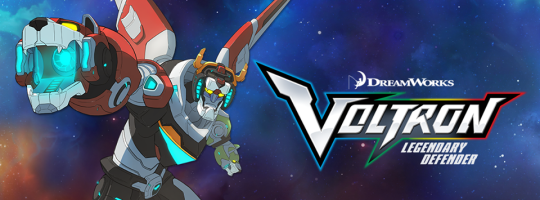
It all began a while ago when Bex liked a comment of a picture. The picture involved a ship called Shei//th. I censored the name so it doesn’t show up in the tags of that on tumblr. But essentially it’s a ship between two characters, Takashi Shirogane, a 25 year old pilot who is the leader of the team, and Keith Kogane, one of the other “paladins” or fighters on the team. People like me find this ship to be distasteful, since Shiro is an adult, and the others are teens (it’s actually a bit messier than that, since an official Voltron source listed Keith as 18, but the producers of the show, Lauren Montgomery and Joaquim Dos Santos, said they were not consulted on the book so there’s some question as to whether it’s canon or not). Either way, the consensus by most reasonable people is that it’s probably not a healthy thing to depict in children’s media, when you consider the considerable age difference, the power imbalance (leader, senior officer with someone they are in charge of), and finally, the iconic line by the character of Keith himself when he defines their relationship as a familial one.

Nonetheless, the ship persists, as nasty things on tumblr are wont to do. There’s a lot of shipping discourse on tumblr between two distinct groups which can be labelled as “antis”–people who are not in favor of any Shiro/paladin ships, or what has become to be known as “shaladins”–people who ship any variation of Shiro with the paladins.
Here is where Bex got involved. On Instagram there was a picture of a black shoe and a red shoe together and the joke was about the shoes being a prophecy that Shei//th would be canon. A joke, mostly, considering all the evidence above. But here’s where Bex got herself in trouble. She liked a comment on the picture where someone said “Keith is a power bottom confirmed.”

Obviously, this caused a bit of an uproar within the fanbase, especially between the discourse between antis and shaladins. Shaladins were celebrating that an Official Voltron Source liked their ship, and antis were angry about that acknowledgement of the ship at all by official sources, and the sexualization of a kid’s show (more on this later.)
So of course this sparked the discourse on tumblr. One user, @lancehunks, who was receiving asks about Bex, tagged her in the replies.They were definitely unfavorable.

and

and a few more.
Bex, being the big strong, adult, woman she is, decided that she could not take this obviously grievous insult to her name [sarcasm], and decided to reblog them all and respond to them. Keep in mind, that @lancehunks was just 13 years old. And Bex (22) decided that these were appropriate responses:
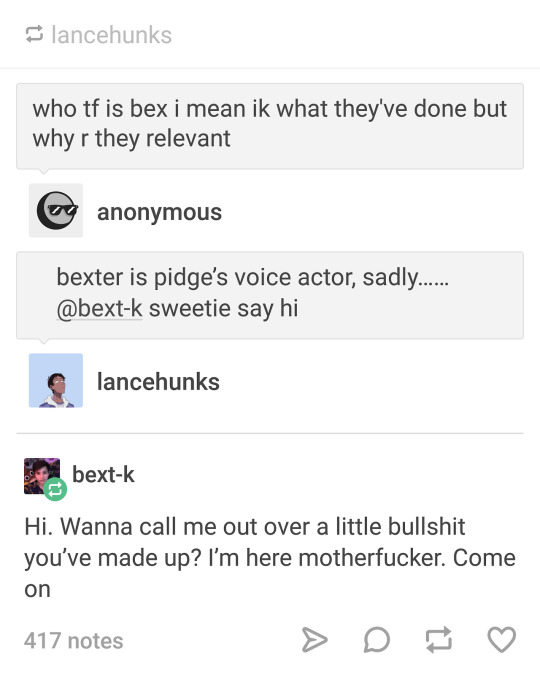
Yep, you read that right. Not only an adult but employed on a kid’s show! To a 13 year old! The target audience of the very show she’s a part of! (Oh, the hypocrisy). But wait, there’s more:

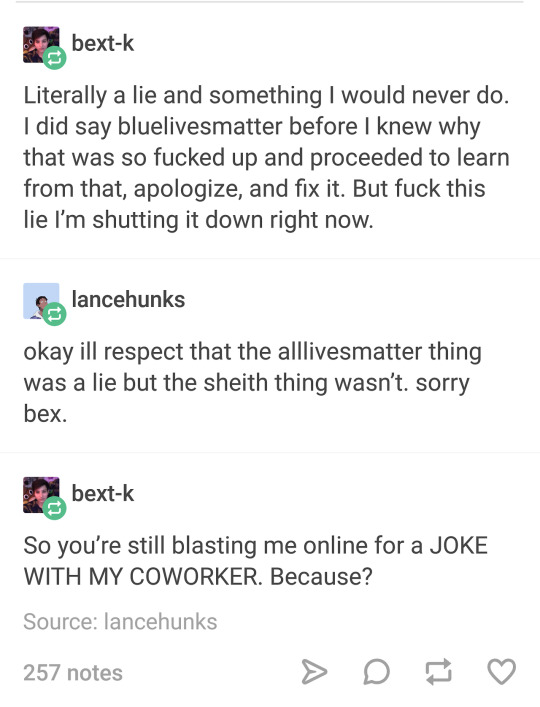

Just in case you’re confused, let me tell you the many, many reasons why this is unacceptable.
Bex is an adult. You’d think she’d be a little more mature by now just in general. It’s the internet and there are trolls.
The person she was addressing was 13!!!! Do I think it was mature to tag Bex in all those posts? No. But it’s… behavior that you can expect from 13 year old’s on the internet. If we swore at and tore down every single one of them every time they did something dumb, we would need a lot more therapists for teens in the world. Plus it’s really disingenuous to pretend that we wouldn’t have done something similar when we were younger if we were in that position.
Bex is famous. While she’s certainly not on the caliber of massive A-List stars like Tom Holland or Zendaya, she has a fanbase that exceeds the normal person’s friend group. Just because she’s been on TV before, she has groupies that will support her no matter what, who will troll for her, who uncritically and unconditionally worship her. I’m not a Bex fan, nor do I really care to know her well enough to know just exactly how many fans she has, to be certain she does have them. When she publicly reblogged those words, that “motherfucker,” those fighting words, she weaponized her fanbase. What I mean when I say that is her behavior gave her groupies permission to behave the same way. By targeting someone who didn’t like her (a thirteen year old!!!!!), she opened the gates to her fans and groupies doing the same thing, to a kid.
This lead to some terrible things happening. The 13 year old was getting death threats, sexual violence threats, and nsfw content, all because Bex just couldn’t let it go.

What does this mean? Finish it? Finish the kid? If you’re so sick of the fighting, then why did you even respond in the first place? Bex is the one who escalated the situation. Bex is the one who caused the fighting in the first place (by that I mean the fighting between the two that night, the fighting between antis and shaladins has been going on for as long as the show).

There we go. Now he have something resembling dignity. But unfortunately the damage was done, and user @lancehunks deleted their blog. As a direct response to Bex’s actions. Bex caused a 13 year old to leave tumblr.
When hearing this news, Bex offered a half-assed apology:
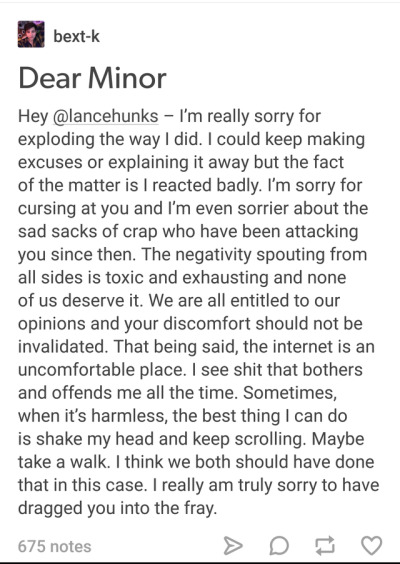
This is the most insincere apology I have ever seen. “The internet has Bad things on it and it’s YOUR fault for seeing them” is not an apology. The best part is that she’s a big fat hypocrite. “Sometimes, when it’s harmless, the best thing I can do is shake my head and keep scrolling.” So why didn’t you Bex? Why didn’t you keep scrolling instead of targeting a 13 year old?
In light of recent political events, though there’s one thing that stands out to me:

Sound like anybody you know? The esteemed President, perhaps?

*disclaimer* I am in no way claiming that Bex is a Trump supporter. I don’t know enough about her–and I don’t want to know enough about her–to know where she leans politically. I’m just drawing the attention to the similarities in moral equivalency going on, here.*
Sure you targeted a 13 year old and weaponized your fanbase, but someone tagging you in a snarky post is just as bad, right? (Wrong.)
You’d think that would be the end. You’d think that Bex would be capable of living and learning, or maybe even just taking her own advice, and keep scrolling. But here we go again.
The next bit of drama started when the possibly canon guide book was released, stating Keith’s age as 18. There was a big celebration on the shaladin side because technically, that would make it “legal” for Keith and Shiro to have sex. Besides the fact that legal ≠ moral, again, Voltron is a kid’s show. But on tumblr this time, Bex posted this.
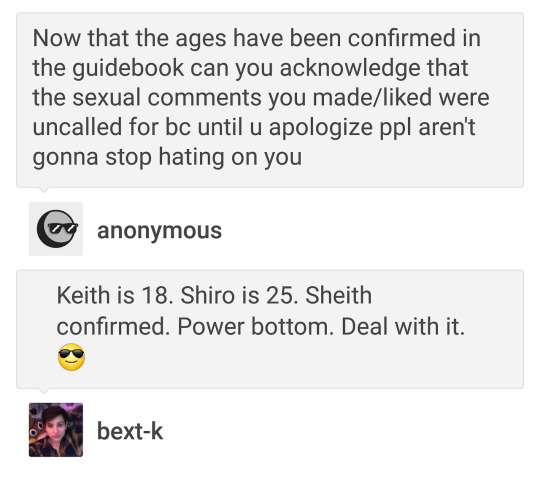
This time, the discourse surrounding Bex was a little different., This time, the discourse mostly focused on the fact that even if Shiro and Keith disregarded canon and morals and the fact that it’s a kid’s show ever did get in a relationship, the only thing that matters is how they like to have sex.
This is a problem for a lot of reasons. There’s a culture, pretty prominent on tumblr of women, mostly white, who are obsessed with gay sex. They write fanfiction and p*rn solely for their own personal gratification. This, of course, is a gross misinterpretation to wanting LGBT+ representation. If you aren’t a mlm (an acronym for men-loving-man, that includes many sexualities) then writing p*rn about is sexualizing them, using them as a tool to get yourself off, and not like complex human people. Mlm are more than how they like to have sex. In fact, that shouldn’t be a part of a discussion for anybody except between willing partners. This also feeds into the popular and damaging stereotype that gay men are predatory by nature.
So, as a whole, not good.
And again, we have a whole situation escalated by Bex. The worst part is, to people who tried to explain this to her, the only response they were given was a gif:

So once again, a minor dared to express their distaste for Bex on tumblr. But this time, they didn’t tag her. This time, they censored her name. But Bex found it anyway. And she decided to do the exact same thing that led to a minor leaving the website, and to stop watching the show.
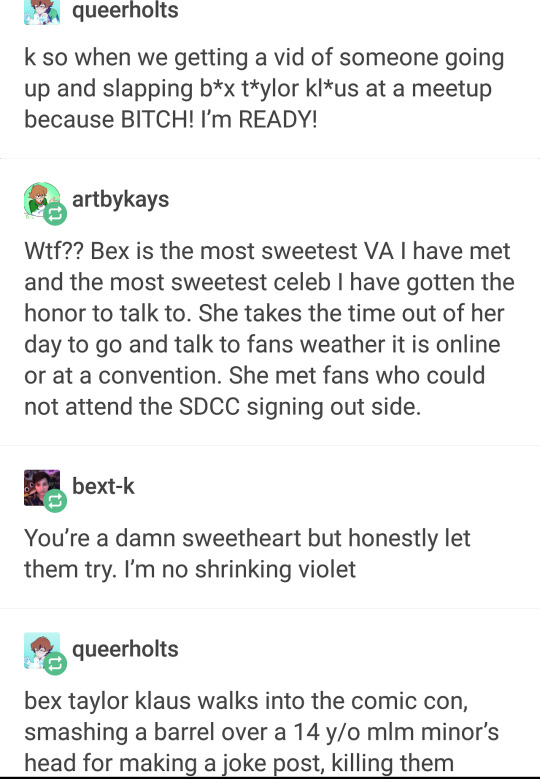
Have no fear, this time though. This time, Bex is going after a 14 year old, at least she’s not going after kids anymore, right? [sarcasm]
Some final notes.
Bex claims to be an LGBT+ rights activist. I’m also pretty sure she’s a lesbian herself (again, I already know too much about her, I’m not looking to get to know her better.) So, you’d think, as someone who wants equality for LGBT+ people and communities, she’d have the wherewithal to listen to specific subsets of that group when they say something about themselves, like, for example, young mlm who don’t appreciate being sexualized by a white woman. So I couldn’t help but laugh out loud when I saw this on her blog:

Now, I happen to agree with the above statement, but it’s so ironic, so hypocritical that Bex is talking about the sexualization of anything. Because kid’s shows aren’t safe from her sexualization and mlm certainly aren’t. How can one person be so incredibly oblivious? A mystery that I don’t have any interest in solving.
I also want to address something a little more devious and a little more dark. I personally know of at least 12 different people who sent Bex asks, politely explaining some of the things I’ve talked about here, or relaying how her words hurt them personally. Bex never answered any of them. But she did answer this:

Just to be perfectly clear, I do not condone or encourage hatemail. Do not send people anything wishing them death or harm in any way. I have never sent nor do plan on sending hatemail, and you should be ashamed of yourself if you do.
However, this is incredibly nefarious. Bex doesn’t answer any of the many asks she got that were polite, but proved her wrong. She didn’t answer any of the young mlm who gave her their personal stories and who weren’t anonymous. Instead, she publishes this. And she did this on purpose, to make her look innocent, to make her look like she’s the one being attacked. I get hatemail every single day too. Things along similar lines to this. I block the user. Delete them, One, because I don’t want to expose my followers to that kind of negativity on a daily basis, two, a mature person knows that deleting them is the best kind of revenge because the user will be constantly looking for a response and they will know they had no effect on me and three, because if you do that, eventually they stop. This is intentional on Bex’s part to make the people who don’t like her look bad. I don’t like Bex at all, and I certainly do not support that message. Any reasonable person wouldn’t. Also the fact that it’s an anonymous message adds a certain air of doubt as to who sent it.
The point is, Bex is purposely ignoring polite and well-meaning people and posted this to “prove” she’s the one on the “good” side because no good person would send that message.
This is also worth noting:

This was posted after the lancehunks debate but before the power bottom comment she made. In this post, Bex admits that a relationship between Shiro and any of the paladins is predatory in nature. She said that. Her words. And then after that she said that Keith was a power bottom.
The last thing I want to say, is that Voltron is a kid’s show. It’s rated US-TV-Y7. Which means for years 7 and older. Regardless of the ship, there should be no sexual content, be it fanart, of fanfiction of Voltron characters at all. We are all collectively responsible for keeping content age-appropriate for the target audience. So, stop it. All and any ships.
For minors, this is my advice to you:Bex is a predator, a hypocrite, and a liar. Do not engage with her. Block her. Do not tag her in any of your posts. She has a history of targeting minors. Protect yourself. Do not engage.
#Unlike Bex I take my own advice and I have blocked her so she can't target me#but you never know with these ones#she can find a way#bex taylor klaus#anti bex#anti bex taylor klaus#voltron legendary defender#long post#anti shaladin#bexcourse
3K notes
·
View notes
Text
Initial Impressions 05: Doomsday Clock

Disclaimer: This Article Contains Spoilers For Watchmen And Doomsday Clock.
To say Watchmen was a good comic is like saying Bob Ross was a good artist; that is, both sentences are obvious understatements. Watchmen was - and remains - a piece of literary genius, a commercial and critical success. It was one of the first graphic novels to make it onto Time Magazine's best 100 novels list and a winner of the illustrious Hugo Award. For those who don't know, Watchmen is a graphic novel written by Alan Moore (V for Vendetta, Batman - The Killing Joke) and drawn by Dave Gibbons and colorist John Higgins. It started publication in 1986, continuing for twelve issues into 1987, before being collected into a single volume that same year. Watchmen's story is a rich and complex narrative that plays out as equal parts political satire, murder mystery, and deconstruction of the superhero genre. It takes place in an alternate history than our own, in which the world saw the rise of the costumed hero back in the 1940s whos presence dramatically altered the course of world events; America wins the Vietnam War, Watergate is never exposed, and Nixon abolishes the term limitations, going on to be president far longer than he ever should have been. The 1980s see America and Russia edging closer and closer to World War III. Amidst all the political chaos the aforementioned costumed heroes have been outlawed, with many of them now retired or serving the government. All of this history leads to the event which kicks off the entire Watchmen graphic novel; The death of the Comedian, a hero turned government agent and the investigation that follows.
I could talk at length about my love of Watchmen from both the original graphic novel to the 2009 film adaptation, praise its subtleties, narrative, nuances, and motifs, but that's not why we're here today. Instead, we're here to talk about Doomsday Clock, the Geoff Johns (Flashpoint, DC Rebirth #1) led Watchmen sequel. The idea of a sequel is outlandish to some, and with good reason; the last watchmen project that went through was 2012's controversial Before Watchmen, a DC comic book series designed to serve as a prequel to the events of Watchmen proper with each story focusing on a different hero or villain from the original series. Led by a myriad of different creative minds, the project was met with lukewarm critical reception, especially by Alan Moore himself. Personally, I consider the series to be fine at best, neither overly terrible or outstandingly good. It certainly wasn't the stroke of mastery that Watchmen was. This could be said for much of the DC universe at this time; 2012 was just one year into DC's controversial New 52 continuity. It abolished decades of established DC history, electing to start a new continuity more accessible to new readers, but left many veteran fans displeased. The New 52 continued from 2011 to 2016, and it was here that DC found themselves at a turning point. The New 52 was coming to a close, and a rebirth was at hand. DC Rebirth, to be exact.
The DC Rebirth special, also written by Johns, served as a return to form; while still following the New 52 history, Rebirth's goal was to restore as much of the old as it could, bringing back characters and storylines lost to the New 52 and incorporating them into the current canon. On a list of things to read before starting Doomsday Clock, this would be number one. The issue follows Kid Flash, aka Wally West, on his journey back home. It serves as the first in-universe indication that things are amiss in the DCU. Something, or someone, has stolen a decade from the world. Memories, Characters, Events...Rebirth kicks off the mystery of who this somebody is in a spectacular fashion - by bridging the DC Universe with that of Watchmen. This bridge would go on to be further established by a myriad of different storylines throughout the current Rebirth comic line, but most notably by The Button crossover event. In The Button, we see Batman and Flash investigate the mystery of a certain bloodstained smiley face which lodged itself in the Batcave at the end of the Rebirth special. It was also with The Button that we got the reveal of Doomsday Clock, which started its twelve issue publication run in the tail end of November 2017.
So, we're here. We're finally at Doomsday Clock. The Big To-Do, the explosive clash between Alan Moore's Watchmen with DC Comics. As it stands right now, Doomsday Clock is one-quarter finished, with three of its twelve issues available to read right now. So how is it? Well, in my opinion, Doomsday Clock is fantastic. It's no Watchmen, but I don't think it was ever supposed to be. Doomsday Clock serves as a direct sequel to Moore's masterpiece and does a good job standing up next to it, at least so far. So far Geoff Johns has done a fantastic job authoring this story, seeding it with mysteries and hooks that keep you guessing and wanting more. His prose isn't identical to Moore's, but carries the same heft and feel. His writing is amplified by the equally fantastic artwork courtesy of Gary Frank and colorist Brad Anderson. Together the two make the comic pop, painting a vibrant collage across every panel and page. Their style is distinct, adhering rather faithfully to Watchmen's nine-panel grid, sporting visuals that feel right at home next to the literary classic. The tone of Doomsday Clock also melds well with Watchmen, with both stories being byproducts of the political climate of their respective times. Watchmen played off of the politics of the eighties, creating an even darker vision of the world in a sort of parody. Doomsday Clock almost got scrapped, before the 2016 presidential election and how the world changed as a result of it. Together they feel like stories that go hand in hand, but for the purists out there, Watchmen can still be seen as its own work, an entity separate from all else.
But what is Doomsday Clock about? As earlier stated, Doomsday Clock serves as a direct sequel to, and a crossover of, Watchmen and DC Rebirth. But what does that mean? Watchmen concludes with Adrian Veidt, aka Ozymandias, succeeding in his mad plot to bring peace at the expense of countless lives. He averts nuclear war through a convoluted scheme involving a faux-alien invasion and the death of over three million people. Following this Doctor Manhattan, the only truly superpowered being of that world, left earth to find a new universe that was less messy than that of Watchmen's. The Rebirth special established the idea that a hidden power was manipulating the DC universe and all of its characters, a godlike entity who has been watching and altering events to their whim or for some unknown purpose. This entity is revealed to be Doctor Manhattan. Through the Rebirth Special, the Comedian's badge embeds itself in the wall of the Batcave. Batman studies this button, along with the flash, leading to an adventure through dimensions, other realities, presenting a further look at the modifications Manhattan has done to the DC Universe. This leads to Doomsday Clock, where the crossover truly begins. The world of Watchmen is in chaos. The people have discovered the truth behind Veidt's scheme, and it pushed them over the brink. Doomsday Clock's first issue sees all of this play out, taking place seven years after the conclusion of Watchmen. Watchmen's world faces nuclear annihilation, and this time nothing stands in its way. Hence a new scheme by Veidt; he builds a team with the sole purpose of locating the absent Manhattan and bringing him back to the Watchmen universe in an attempt to right the world's wrongs.
This is the basis for Doomsday Clock's story - the hunt for Doctor Manhattan, and the investigation into his true impact on the DC Universe at large. Veidt's team for this universe-spanning endeavor consists of himself, a new Rorschach, and two original characters; The Marionette and the Mime. The first Doomsday Clock issue sees them all coming together, while the second one sends them on their way. As of Issue three, all the players are in motion. It is here I want to diverge a moment and express a certain admiration for an accomplishment Geoff Johns has met with this story. With the Marionette and the Mime, Johns has managed to create new characters that still feel like they could have existed back when Alan Moore first wrote Watchmen all those years ago. Mime and Marionette, much like the other characters from Watchmen, are based on Charlton Comics characters - Punch and Jewelee. Husband and Wife, both are costumed villains in the Watchmen universe, with Doomsday Clock #1 seeing Rorschach springing them from jail in order to recruit them for their mission. Mime is mute, as his name implies, while Marionette is the voice. Doomsday Clock's second issue establishes a believable backstory, solidifying their necessity and value in the events to come. It is with these original characters that Johns proves he is more than capable of capturing Watchmen's tone and feel, a fact that is further solidified as the story goes on.
On the DC side of things, Doomsday Clock is set one year into the future of all current DC stories, further emphasizing that this is the tale Rebirth has been leading to since issue one. The world is faced with a superhero identity crisis; a new theory has been bred that asks the question, "Why are almost all the heroes and villains American?". Dubbed the Superman theory, it has the DC world in its own state of disarray, proposing the idea that the American government has found a way to create heroes and villains in an attempt to get an edge, hence its large number of metahumans as compared to any other region of the world. This ire spills over to Batman as well, with some of our first moments in Gotham being as viewers to a rather angry protest of the Dark Knight. This hasn't stopped Batman from doing what he does best, but it does show a dramatic tonal shift on the behalf of public perception to his heroics. Under the Cowl, Batman isn't faring any better; Wayne Tech and LexCorp are currently at war with one another on a corporate level. To quote Sally Juspeczyk from Watchmen, "Things are tough all over, cupcake."
We're only three issues in so far, but already Johns has proven his worth and created a story just as compelling and intriguing as the stories it strives to succeed. Watchmen was a masterpiece of its time, a piece of literature that continues to stand as a pillar of the comic book industry even now. Doomsday Clock feels like a pleasant complement and a strong sequel, expertly mirroring the narrative flow, the subtleties, and the visual flair of Moore's work while still putting new ideas on the table. It's too early to say whether or not Doomsday Clock will have the same impact as Watchmen, or be the same stroke of literary Genius, but I don't think it needs to. The world already has a Watchmen. Doomsday Clock is shaping up to be something familiar but new, something that can stand on its own merit while still being an impressive sequel to one of the best graphic novels ever written. Doomsday Clock's initial three issues are available now, its fourth releasing on March 28th. The clock is ticking across the DC universe, and with nine issues left to go, all we can do is wait and see what mysteries it has in store for us next.
1 note
·
View note
Text
Hello i love y’all and i wrote more of ridiculous knight and ridiculous lizzermonster dancing because i am hopeless, hopeless, absolutely hopeless
Even With Missteps (Chapter 2)
[Ch 1] [ao3] [Ch 3] [Ch 4] [???]
Fandom: The Penumbra Podcast
Relationship: Sir Damien/Rilla, Lord Arum/Sir Damien/Rilla, Lord Arum/Sir Damien
Characters: Lord Arum, Sir Damien, Rilla, (other characters mentioned)
Additional Tags: Second Citadel, Lizard Kissin’ Tuesday, Unresolved Romantic Tension, Dancing, Costume Parties & Masquerades
Summary: There is a masquerade ball in the Citadel tonight. Every knight and citizen has turned out, and all of them bear disguises of monstrosity. What better time could there be, for a monster who needs to find a way inside?
Chapter Summary: Is he still a thief, if he returns what he has stolen?
Chapter Notes: I straight fucking lied when i said this was complete with the first chapter. I just never thought I would actually finish this chapter too. Fam i am so far gone on this mess. They're sending me to space. This is. Too Tense. Happy Lizard Kissin' Tuesday!!! ;3 Also chapter specific warning for a brief moment of (what i would call canon-typical) mild suicidal ideation on Arum's part. Just one parenthetical, really, but please take care of yourself if that's an issue for you! <3
~
Arum hears the rustle behind him, the distinct sound of an arrow being nocked, and he scowls beneath the warm copper of his mask in self-deprecation. Too distracted, tonight. Altogether too distracted-
“Do not move, villain,” says a clear, sharp, familiar voice, and Arum grits his teeth. To keep from barking out a laugh, for the most part. “A knight of the Crown shall not suffer an intruder in her majesty’s chambers, not even on a night of such inverted morals as this.”
Arum does not move. He drops his hands from the closet in front of him, the silk catching on his claws, but he does not turn towards the human he suspects is standing at his back when he murmurs, “How did you know I was here?”
“A keen-eyed attendee happened to catch sight of your ascent,” the voice says, wry and insulted. “And the manner of your climb would suggest that either you have an inhuman proclivity for scaling walls, or that you are, in fact, inhuman altogether. A monster, intruding upon our Citadel. So, which is it, fiend? Am I placing you under arrest, or does this arrow fly now?”
“I was under the impression we were all monsters tonight,” Arum says, tilting his head, turning just enough to look over his shoulder. “And I thought that you were enjoying playing so, little basilisk.”
Sir Damien’s aim does not waver, but his eyes widen, his expression cracking into flushed surprise. “Ah- Arum?”
“Honeysuckle,” Arum greets, turning more fully, and Damien stares down the shaft of his arrow at him like a stunned rabbit. The little knight is still in his costume, still staring out from between sharp little fangs, but he appears to have summoned a quiver to go along with that bow of his.
Arum could bolt. It would not be difficult. He is quick enough that he knows he could dodge that arrow before it pierces him. He could almost certainly leap to the window, or pounce upon the knight himself, or rush past him to the door.
He stands still, though. He stares at Sir Damien, and certainly it is curiosity and nothing more that holds him in place. Will the little knight fire? Will he try to fight? Arum’s palm remembers the shape of Damien’s hip and he clenches his jaw tight and tilts his head, watching, waiting to see if the little basilisk intends to strike.
"What-" Damien pauses, cheeks dark, bow steady. "What are you doing up here?"
"Oh," Arum says. "Intruding, and taking what does not belong to me. Obviously."
Damien laughs, bright and surprised, and Arum swallows down the urge to step closer. "A thief," he chimes, and without taking his eyes off of Arum he shakes his head. "And so brazen about it, are you?"
"I do not see why you should be surprised, honeysuckle," Arum says with a shrug. "I stole from you already, did I not?"
Damien blinks. "You- what?" The knight looks, for a moment, half tempted to check his pockets.
"I stole a dance. A rather daring theft, if I do say so myself, considering the obvious deadliness of my mark."
Damien laughs again, and Arum tries not to feel it as a victory. The knight seems entirely determined not to drop his aim, after all, and it isn't as if the laughter on its own is of any value, regardless of the strange way it makes Arum's hands flex.
"Are you armed, then, thief?" Damien asks, and then it is Arum's turn to laugh.
"Quite," he says. "Though I do not see the point of drawing knives upon an archer."
“So…” Damien tilts his head, his eyes narrowing, more curiosity than suspicion. “You intend to come into custody, then?”
“Not at all, honeysuckle.”
“I do not wish to fire upon you, friend dragon, but you seem keen on making that quite difficult for me,” Damien says, and his brow is furrowed though his voice is still bright.
“I am aware,” Arum says.
Damien stares at him, the moment stretching out as Arum watches the human, as the tightened bow waits for ease in one of two ways.
“Remove your mask,” Damien says, at length, and Arum can’t help the laugh, then.
“Are you certain, honeysuckle?” Arum asks, and he does not bother to conceal the way his voice goes halfway to purr. “Is that truly what you desire? You seemed quite concerned, when we danced, about not betraying… how did you put it… the spirit of the event. Has that changed?”
“We are not dancing any longer,” Damien says, quite seriously. “You have revealed yourself as a thief. That is what has changed.”
“Oh, is that all that concerns you?” Arum says, and then he does take a step closer, finally. Damien raises the bow another inch, but Arum does not stop. He is curious. Terribly curious. How far must he push, for this knight to do his duty? How many steps must Arum take, for the knight to fire?
(Certainly he can avoid the arrow, but even if he is mistaken it will be an acceptable outcome. If he is killed here, the Senate will not have the patience to wait for his replacement to grow enough to be useful to them. They will have no hold left upon the Keep, it will be useless to them without a familiar, an interpreter. His death will be unfortunate but it will still serve his purpose, it will still protect his home in however an unpleasant way, though for some strange reason he cannot seem to make himself believe that Damien actually will- that the knight will-)
“Stop,” Damien says, his authoritative tone cracking uncertainly in the middle. “Do not take another step or I shall-”
“We could dance again, if that is what you would prefer,” Arum says, ignoring his words and creeping another step closer. “I can still hear the music from below - quite fascinating acoustics, this tower seems to have - and there is enough room here to take another turn together.”
“I will not fall for your tactics of distraction,” Damien says, but he still has not fired, and Arum is still moving, still closing the distance. “I will do my duty-”
“If you do intend do shoot me, honeysuckle, you will need to do so before I am too close to shoot,” Arum says, mildly, and the tip of the arrow is mere inches from his chest. “Or, you may dance with me again, and perhaps when we are done I will give you what you request. I will show you my face, and then you may decide if you intend to follow through and loose your arrow at last.”
The arrowhead scrapes the purple of his cape, tickles his scales through the fabric, and Damien is looking up at him with such uncertainty that Arum can nearly hear the shouting in his mind. He can certainly hear the shouting of his heart, hammering away in that chest, and the sweet sharpness of his breath.
“I stole a dance from you downstairs, honeysuckle,” Arum says, quite softly, and then he lifts a hand. “Would you give one to me freely, now?”
“I-” Damien stares at him, his eyes so clear and bright beneath his mask. “I… I cannot hear the music, from here,” he murmurs, and Arum could laugh- the limited sensory ability of humans strikes again, it seems.
“I can hear it well enough for both of us,” he says, feeling reckless and absurd, his hand still in the air, and he knows he has won when Sir Damien breathes a laugh and, at last, he lowers his bow.
Such a naive little fool, Arum thinks without heat as Damien drops his arrow back into the quiver, as he puts his weapon away, as he eyes Arum curiously. Such a ridiculous trick to fall for.
Any moment now, Arum will set upon the knight. Damien’s warm hand takes his own, and he slots his body close to Arum’s again. Any moment. At any breath, Arum will knock this knight to the ground. Will set on him with his knives, will claw him open. Will escape. Damien raises an eyebrow, and looks up at Arum for the length of a few long, quiet breaths.
“You will have to lead, of course,” he reminds, softly. “The music is in your ears, Arum, not mine.”
This is the moment, of course. There is a task before Arum, and this knight is in the way. He and his pretty voice and his careful steps and his clever face. He is in the way. Arum is supposed to remove him, now. To perform the task that he must.
Arum begins to dance.
It is a slower turn than the one they took together down below. The band is playing gentler, now, easing the crowd into the middle of the evening. Damien follows deftly although he cannot hear the beat, his eyes a little guarded, and Arum feels strangely helpless before that gaze. He begins to hum along with the melody as he moves, and then the corner of Damien’s mouth curls up just slightly. That feels helpless as well.
“I know this tune,” Damien murmurs, swaying in Arum’s arms. He begins to hum as well, then, harmonizing with Arum as they move, the ease of the notes making something in Arum’s stomach twist oddly.
Arum almost doesn’t notice their movements gentling, doesn’t realize that the steps they are taking together are softening until the both of them are barely moving at more than a sway, and Arum does not think he could grow accustomed to Damien’s unwavering heat pressed close against him if they danced like this for the fullness of a year. Something about it makes him breathless, and he can hear the way his little basilisk’s heart is thudding, faster than the beat of the song.
“Arum,” Damien murmurs, and Arum realizes that they have stopped moving, now, as Damien peers up at him from beneath his costume fangs. “I…” he pauses again, licks his lips, and then quirks them up into a hesitant smile. “I did not know dragons had such lovely voices.”
Arum breathes a laugh before he can stop himself, his hands on Damien’s sides squeezing lightly. “We don’t, little flatterer. You, however- I knew you had music in your voice downstairs. Even in speaking it rings like bells. A fine trait for a poet to possess, I should think.”
“Oh.” Damien laughs as well, eyes bright and playful. “Oh, you cannot call me the flatterer when you speak so, Arum.”
“I suppose that is fair enough,” Arum says. Damien cannot see his answering smile behind the mask, and so he does not bother to try to hide it. “Then I will content myself to thank you for the compliment.”
Damien’s hands are easy and soft on Arum’s shoulders, and the knight stares up at him for a long moment before he clears his throat.
“Has- has the song ended, then?”
Arum blinks. “What?”
“You’ve stopped dancing.”
“O-oh.” Arum bites back a whirring rattle of embarrassment, and makes himself give a stilted laugh instead, pretending not to be strangely overwhelmed by the amused look the poet is giving him as he stammers. “No, it is still- I- I was simply- distracted-”
“Sir Damien?”
The booming voice is muffled by wood and stone, but it is not distant enough for comfort and it drops down Arum’s throat like a chunk of ice. Damien looks similarly stunned as they both jolt, surprise making Arum loosen his snug grip around Damien’s midsection.
“Sir Damien, have you found the intruder yet? There was nothing in the eastern tower-”
“Angelo,” Damien mutters, his expression a little wild, and then he looks up at Arum with fear and guilt both clear in his eyes, his own hands pressed to Arum’s chest.
“It seems our time has run out before our dance is finished, honeysuckle,” Arum murmurs, and he is torn between the urge to laugh and the urge to bury his face in his claws and scream. “I admit- I admit I am disappointed.”
Damien makes a choking sort of noise, and it shifts into something of a laugh as he steps back, pulling himself from Arum’s softened grasp. “Yes, I- I am as well. But-”
Arum sees the sharpness that has returned to Damien’s eyes, the stiffness that has returned to his posture.
“You have your duty, Sir Damien,” Arum murmurs. He will not die for this little knight, no. He may- Arum may have some strange fondness for him, may have made some foolish allowances, but- there is a window within reach and if he needs he can easily knock this human to the ground, at the very least-
Sir Damien does not draw his bow again, however.
He stands, only a foot or so away from Arum but distant and cool, now, and he mutters tranquility under his breath three times like some sort of spell, and then he straightens his spine as he meets Arum’s eyes again.
“My duty,” Damien echoes, frowning. “You do not belong here in these chambers, of course, but- had you-” Damien hesitates, his hands flexing awkwardly at the strap of his quiver. “Had you taken anything before I found you, Arum?”
Arum works his jaw, clenching his teeth for a long moment before he answers, realizing only as Damien asks that he has been- utterly distracted from his purpose by this little diversion. “No,” he admits in a hiss. “I was not expecting interruption quite so soon.”
“Then it seems that the only person you have stolen from,” Damien says, “is me. If you remove yourself from these chambers, there will be no further cause for conflict or alarm.”
Arum stares down at the knight. “You… you are… full of surprises, little honeysuckle.”
“You stole a dance, as you said. I think in giving you another, we have evened that score. The only other thing you stole from me-”
He pauses, and Arum hears the poet’s heart stumble, hears his breathing pitch a little strange.
“What… what else have I stolen, little basilisk?”
Damien steps closer again, and Arum smothers another compulsive noise as Damien’s hands find his shoulders. “A kiss.”
Arum blinks, and Damien bites his lip before he meets Arum’s eyes to continue, lifting his hands further to very, very lightly cup the cheeks of Arum’s mask, a thumb brushing down one of his stylized teeth.
“It was a rather innocent one, and with this barrier between us, of course. And I- I believe you told me that when we finished our dance, you would remove your mask.” Damien inhales, unsteady, before he continues, “Show me your face, Arum, and return the kiss you stole, and- and I shall have no cause to call you a thief. I will be content to consider this a mistake, and you may leave without harm.”
Arum realizes that his own heart is pounding, too, from some combination of desire and despair. He wants-
Arum wants many foolish things, just now. This ridiculous human revelry has caught him up in its net, and his mind is spinning with song and heat and touch and laughter and all of this has been too much like a dream, too much altogether, and if he means to survive, he must wake up.
Letting Sir Damien know the face of the monster he has been in the arms of for much of the evening might serve to do just that, Arum thinks, perhaps a little wildly. This dream will certainly not survive that shock. Not for either of them.
Arum inhales, swallows, and with his heart still pounding he nods.
“If those are your terms, honeysuckle,” he says, his voice low in the effort not to shake. “Lift my mask, then. I shall do as you say, return the kiss I stole, and then I will- I will leave.”
Damien stares up at him, his eyes flicking between Arum’s, and after a moment his gentle hands push the mask up, and just as Arum suspected the knight’s eyes go wide with shock when he sees Arum’s face through the dark.
Damien seems stunned to stillness, near to a statue, and Arum can hear the footsteps of the other unwelcome humans slowly growing closer, and Arum still feels mad with this evening, still feels the rhythm of his heart or the rhythm of the dance downstairs beating through his very bones, and Damien has not leapt instantly to attack and that is certainly only the shock of Arum as he truly is, but-
Before Arum can reconsider, he leans down.
He is only doing as Damien asked, of course.
Damien makes a muffled noise as the thin line of Arum’s lips presses against his own, and Arum barely knows what he is doing but Damien kisses back after only the briefest of pauses and the heat of his skin is even more pleasant like this, his breath even sweeter when gasped against Arum’s scales, and Arum realizes that he has lifted his hands to cup Damien’s face only after he has already done so.
Damien breaks the kiss but does not pull back just yet, pressing his forehead against Arum’s as they both breathe, as they both find their footing again.
“Have I provoked you to bite, yet, little basilisk?” Arum hisses against Damien’s lips, and the poet gasps, his hands flexing against Arum’s shoulders.
“Sir Damien?”
The voice is far too close for comfort, now, likely only a room or so away. Arum does not have time to understand what he has just done, what Damien has allowed. He only has survival. The other knights-
They will not be like his little basilisk. He knows that, at the very least.
Damien stumbles back a step, pressing a hand to his mouth with his cheeks painted so very dark, and when he lifts his eyes to meet Arum’s again, Arum-
Arum hears the latch move on the door. The song is over, and they are out of time.
Arum flips his mask back down over his face, stares at Damien for only one more heartbeat, and then he turns to spring towards the window, back into the night and the noise outside.
#elle's fanfic#the penumbra podcast#second citadel#rad bouquet#lizard kissin' tuesday#lord arum#sir damien#even with missteps#fhhghhfhhasdjasf y'all.......
27 notes
·
View notes